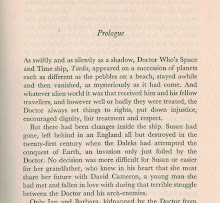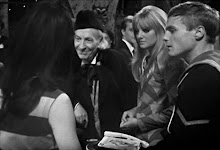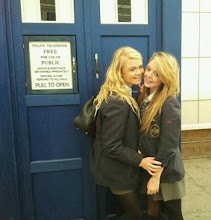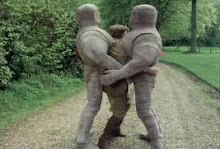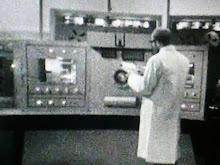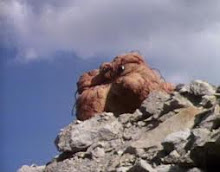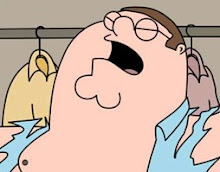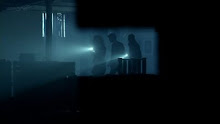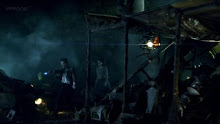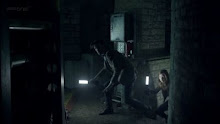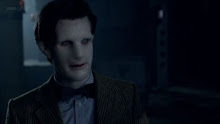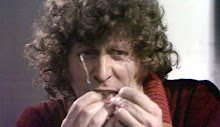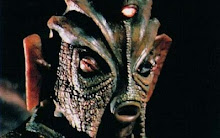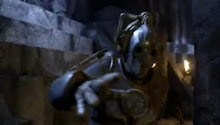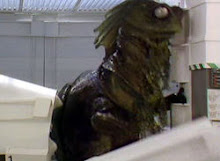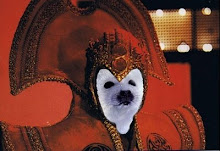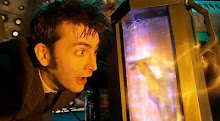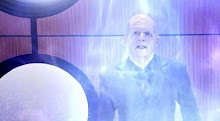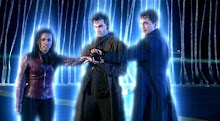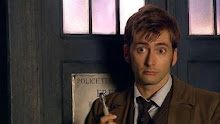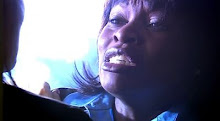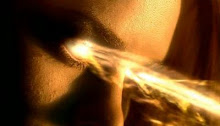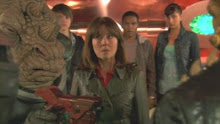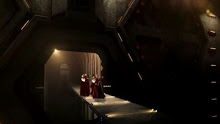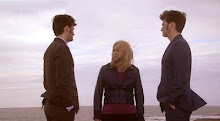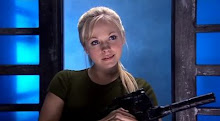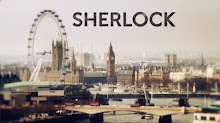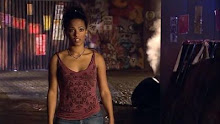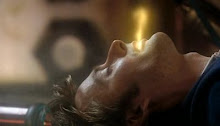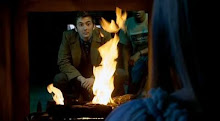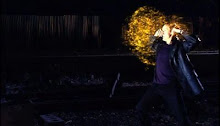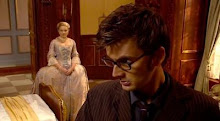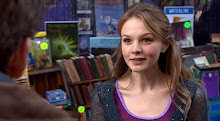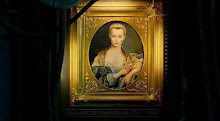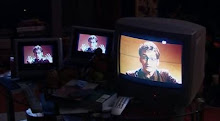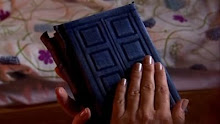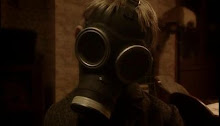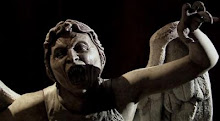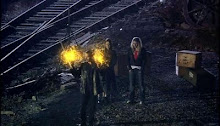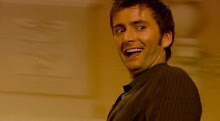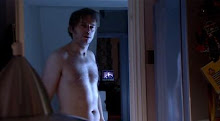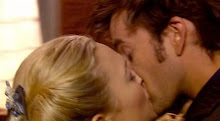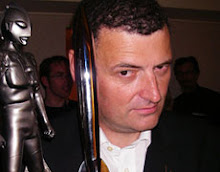Steven Moffat: The Unauthorised Biography. The power! The passion…!
I can't remember, now, why I might have been staying home from sixth-form college that day. Nor can I remember why I might have been watching Children's ITV at half past four in the afternoon, and I certainly can't remember why I didn't even bother reaching for the remote control when the voice-over announced a programme called Press Gang. A series about a whoop of schoolchildren running a junior newspaper is not, under normal circumstances, the sort of thing that a seventeen-year-old geek-boy in 1990 would have found acceptable: for anyone who went through puberty in the 1980s, it has that horrible smack of Jossie's Giants about it. In fact, I'm not even sure why I sat through the whole twenty-five minutes, since the opening scenes didn't do anything so far-removed from the usual run of adolescent programming that it gave me a specific reason to keep watching. No Egyptian gods, no horses on space-stations. Still, by the time the end credits arrived, I'd found myself genuinely concerned over the question of whether the Male Lead and the Female Lead (who were entirely new to me then, but whom I later discovered had been suffering UST for all twelve episodes of the previous season) would end up getting it on. I made a note to watch this programme again, if ever I should be at home on a Thursday.
Three weeks later, I was, just in time to catch the episode which ended with the all-important "Spike and Lynda agree to go on their first date" cliffhanger. At this point, the programme crossed the line from "watch this if you're available" to "set the video", and the following episode - "At Last a Dragon", considered in Press Gang circles to be the centre-point around which the rest of the series revolves - convinced me that it was probably the best thing on television. However, this was something I had difficulty explaining to my peer group, especially the "better than Doctor Who" part of the argument. They assumed I was being ironic in some way. Bear in mind that 1990 was the start of the Irony Age, when near-adults would watch Byker Grove in the belief that they were being post-modern (even now, Ant and Dec's career seems to be built on the principle of the audience pretending they're good) and spliff-addled teenagers would tune into repeats of Dogtanian and the Three Muskahounds just to sing along with the theme tune. The notion that Press Gang was actually good good, rather than kitsch good, wasn't easy to get across.
So when Steve Lyons gave a nod to the series in the dedication to Conundrum, and the paperback, celebrity-free version of Human Nature went one better by giving a credit to the programme's sole scriptwriter, it was nice to know that I wasn't just imagining it. His ascension to emperor-elect seems almost inevitable now, but what's notable is that people were saying "if Doctor Who comes back, then they should get that Steven Moffat to write for it" as early as 1991. We might also note that Press Gang began in the same year that original-flavour Doctor Who ended, raising the question of what might have happened if John Nathan-Turner had managed to hold on for just a few more years, and Moffat had ended up writing for the pre-CGI, pre-mini-movie version. "Blink" on old-fashioned video-stock would, after all, look like the natural follow-up to "Survival".
"Moffat"! Somehow, I find it impossible to think of him as "Steven". I can comfortably refer to the man who dropped my manuscript down the back of a shelving-unit as "Gareth", or the man who gave us Donna Noble as "Big Russell", and yet… perhaps it's his snarling, predatory Scottishness, but Moffat's name is one that has to be snapped. I can't hear it without feeling as if someone should be waving their fist in the air at the same time, like a headmaster shouting at one of the Bash Street Kids… or, perhaps more appropriately, like a headmaster shouting at a wayward teacher in a '70s sitcom. I say "snarling", although if you watch it again now, then one of the key things to notice about Press Gang is that it's basically a work of idealism. It's not just that Moffat seems to have been on a mission to make children's TV that worked properly, but that the programme's entire philosophy comes across as an idealistic one. Bear this in mind, because it's going to be important later. The Press Gang universe is full of twisted, neurotic personalities, yet cynicism rarely wins out, and the fight usually turns out to be worth fighting.
(Well… up to a point. In the final series, something terrible happens to the makeup of this universe, and female characters who've previously been depicted as intelligent, principled and self-reliant suddenly become parasitic harpies with absolutely no taste in men. It's worth mentioning that Moffat's next project, Joking Apart, was a sitcom about a comedy writer who's going through a hideous divorce. I never asked him about this, but the conclusion seems obvious, in much the same way that you just knew Warlock had to be written by a man who'd recently been dumped by his girlfriend.)
I finally met Moffat on the 1st of April, 1998, the same day that I played an elaborate April Fool's joke on Stephen Cole by dumping 450 pages of Interference on his desk and saying "look, I just wrote a Doctor Who book!". The first time I saw him, he was in the middle of a loud and marginally drunken conversation with a female acquaintance. He was complaining about a kitten. Had his wife bought a kitten, or did one of his friends have a kitten that had annoyed him in some way, or…? It wasn't quite clear, even at the time. What I remember is that his acquaintance responded to this by protesting, 'but it's so cute!'. To which Moffat shouted: 'It'd look cute stuffed!'
I think I must have realised, right then and there, that I'd misread the situation entirely. I'd assumed that he'd be like one of the idealistic personalities from Press Gang. In fact, he was like one of the twisted, neurotic ones. With hindsight, it seems so obvious.
From a personal point of view, it's not difficult to understand why Moffat and I have never precisely seen eye-to-eye. Let's start with the Krays-style argument that men never really grow up, or at least, that they never manage to break out of the rules they set for themselves during adolescence. We'll take it as read, just for the time being, that every adult male has in some way become "stuck" during that long hormonal death-crawl from puberty to home-ownership. If true, then the difference between myself and Moffat is simple: I never quite stopped being seventeen (the age at which I first saw Press Gang, although I'm assuming there's no connection), whereas Moffat never quite stopped being nineteen. There's a whacking great gulf between the two. A seventeen-year-old, especially a bright seventeen-year-old, is fundamentally driven by angst. His mind will be open to whole new empires of experience, but he'll have no way of contextualising this in terms of the people around him. This will make him frustrated, and often socially clumsy, likely to be an idealist but with no clear idea of how to put his idealism into effect. He's inclined to be a poet, if only a bad one.
But this sort of thing doesn't trouble the nineteen-year-old, who will have worked out exactly how to deal with other people, even if it means doing everything possible to cover up any sign of emotional weakness. He'll have no time for angst, since he'll be too busy hanging around the university bar, trying to impress the girls. And, to be fair, often succeeding. If he has any neurosis, then it's the neurosis of a manchild who knows he can't ever be seen to lose any of his credibility. Idealism is fine, but only if you don't look too enthusiastic about it, and only if there's a chance to take the piss out of anyone who's less arch and impassive than yourself. (In Moffat's case, I've seen him deliberately sabotage geeky-sounding conversations that he obviously finds quite interesting, just because he can't allow himself to feel like a geek… q.v. what I said about his appearance on the Confidential accompanying "The Doctor Dances", pretending not to know what nanites are.) As a great writer once said, however: the most important thing to notice about someone who uses his sense of humour as a weapon isn't that he has a sense of humour, but that he needs a weapon.
I'll give you the short version, if you want. I like Star Wars because of its dynamism, its scope, its technique, its sheer artistry. Moffat likes Star Wars because Han Solo's dead cool and there's lots of sexy hardware. In that light, those who've read "The Book of the World" might want to take a moment to consider the difference between my idea of a great big cosmic library and the one we see in "Silence…". The "Book" version is designed to suggest the Big Picture, the sense of something huge and majestic waiting beyond the walls, ready to break open the story-universe. It's basically a world-building exercise, which is why the descriptions are so bloody long (it's not like "Blink" or "The Sontaran Stratagem", y'know… if you're creating a whole ecosystem from scratch, then you can't just say "right, now we're in a warehouse" and leave it at that). Whereas the "Silence in the Library" version is about the individual elements, not the environment. There's a conceptual monster that children can turn into a playground game at will, at least when it's sunny; there's an ensemble cast that covers all bases, with enough snappy one-liners for everyone; there's a framing sequence about a reality-shift between the normal world and the nightmare, one of Moffat's specialities ever since Press Gang; there's a chief supporting actress who's capable of slick backchat with the Doctor; there's this year's big character-gimmick, i.e. an apparent future companion; there's techno-chic for the hard SF fans, and an implied Horror from the Dawn of Time for the gothicists. In short, this episode's got everything it needs to be… well… cool.
So obviously I prefer "The Book of the World". Not purely because I wrote it, but because I'll go for "world-building" above "cool" any day. Moffat is built the other way around. Both of these approaches can be thought of as adolescent (and there's nothing intrinsically wrong with that), although they're very different stages of adolescence.
Moffat didn't pay much attention to me, the first few times we met. This seemed reasonable, since I didn't have XX chromosomes and big honkers, although things changed when - for whatever reason - he read Alien Bodies. The next time we found ourselves in the same pub-space, he bounded up to me and started telling me how good it was, while I stood there trying not to look alarmed. Ten years on, this sounds as if it should have been a meeting of two gargantuan talents (yes it should, shut up), and yet in a way, it guaranteed that we were never going to be close. When I say that we didn't see eye-to-eye, I mean it in a sense that's almost literal. Remember, you've got to think of this as a confrontation between an awkward seventeen-year-old (actually 26) and a socially-ambitious nineteen-year-old (actually 37). Anyone who's ever met me will know that I'm not very prepossessing at the best of times, and having decided that I was competent as a writer, Moffat immediately seemed to take it upon himself to… how can I put this? To treat me as if I were a promising young acolyte. He was always aware of his status as the high-ranking, award-winning member of the Doctor Who Gang, and used terms like "alpha male" rather a lot in conversation: again, this is going to be important later on, when we try to work out what he's likely to do now that he's the King of the World. I realise, looking back on it, that I was deferring to him all the time. I didn't realise it then, because I wasn't fluent in body language.
There's a thing called the "power-pat", and it's a way for the alpha male to demonstrate his dominance over the other males in such a way that it looks perfectly friendly. It's so primal that gorillas have been known to do it, and so powerful in its social impact that world leaders are now trained in its use by body-language specialists (George W. Bush did it to Tony Blair during every public meeting they ever had, as if we hadn't already worked out which of them was taking it like a bitch). I only found out about this circa 2000, which is why I didn't initially understand why Moffat kept putting his arm around me every time he saw me. When I did work it out, I felt rather annoyed, and told everyone I met at the Tavern that he had a gay crush on me. Sure enough, he'd invariably walk up to me, touch up my shoulders for a while, then walk off again, at which point everyone would start giggling. And, on one occasion, writing "SM4LM" graffiti on one of the tables. Eventually, after reading up on bonehead non-verbal communication, I decided to try putting the boot on the other foot. The next time Moffat approached me, I turned around, reared up to my full height, advanced on him like a wall of hairy man-flesh, and - for the first and only time - took the "offensive" role in the conversation, questioning his own life and career as if such things were obviously my business. He started to shrink back, and after a couple of minutes, I realised that he was actually deferring to me. And I remember thinking: dear God, is it really this simple?
You see what I mean about all men being conditioned by their adolescence. But if all this monkey-posturing sounds absurd, then let's put in the context of the late '90s / early 2000s. You may remember a time, in the days before "Doctor Who fans" meant thirteen-year-olds, when the Virgin / BBC novels actually seemed important. The authors certainly thought they were important, and pride was their most valued possession. After all, the reason I gained a reputation as an unhealthy influence was that I broke what Keith Topping called "the unspoken code", the Omerta-like law which held that New Adventures writers should all stick together in the face of fandom and not publicly criticise each others' work. I say "Omerta", but in practice, they behaved more like Medieval overlords than mafiosa: the elite have to form a united front, because otherwise, they'll be revealed as weak, flabby individuals and the peasants will get ideas above their station. Oh, and you're the peasants, by the way. When the new series began, those authors who were promoted to scriptwriter-level went from "overlords" to "royalty", which is why my heartless attack on Mark Gatiss was received with the same shock as if a small-time landowner in the Middle Ages had just referred to the Prince of the Realm as a big spaz.
You think I'm exaggerating…? Then consider this. When Paul Cornell took me to task for the social faux-pas of having opinions, he seemed appalled that I was incapable of respecting the natural hierarchy, and asked whether there was anybody I 'bent the knee' to. Bent the knee…? What is this, geek feudalism? When I told him that I had no interest in serving or reigning, he asked me: 'Do your followers know that?' I found it horrifying that anyone could even think that way, and I still do.
I digress, but only slightly. The upshot is that I have no interest in power, either my own or other people's. The adage that "power corrupts" misses the real issue, which is that the very definition of power is "the capacity for abuse". I managed to make Steven Moffat my bitch, just the once, by making the same moves that a gorilla might make while attempting to take control of the flange. I couldn't keep it up, of course. Being a pack-alpha is far too much like hard work. I'm an anarchist, for f***'s sake, seventeen-year-olds are allowed to be.
So, this is what we should bear in mind about the boss-to-be. He's a man who's painfully aware of his own status, to the point where he used to be known in certain circles as Steven "Did I Mention I've Got a BAFTA?" Moffat. But more ominously, he's a man who's spent an awful lot of time in the company of people who are even more status-obsessed than he is, and who've traditionally had difficulty telling the difference between "fandom" and "serfdom". It'd be unfair and inaccurate to say that he desperately wants to be liked at any cost, but it is reasonable to say that unlike Russell T. Davies, he's not naturally inclined to write anything which might risk alienating a large chunk of the audience. Those of you who don't like "Gridlock" or (the big one) "Love & Monsters" will no doubt be delighted to hear this, but some would argue that Doctor Who is in a better position to take interesting risks than anything else on television. Fortunately, Moffat is one of the few writers working in modern-day TV who's actually capable of writing rather than just storyboarding, so his episodes tend to be worth watching even when they're playing it safe. "Silence in the Library" is a good indicator: the scenes set on what-looks-like-Earth aren't really going out on a limb, since they just employ the author's favourite technique of setting one branch of the story in a "side-space" away from the main adventure (this started with Press Gang's "Going Back to Jasper Street", which Cornell unquestionably had in mind when he wrote the framing sequences of "Father's Day"), yet they're different enough from the "normal" run of this year's Doctor Who to be attractive to the viewer. If we're talking about his tendency to avoid big risks, though, then the real test-case is…
…oh, Christ, here we go again…
…then the real test-case is "Blink", which still seems unforgivably lazy to me. This is an episode that wants us to believe it's character-driven, but one of the problems with today's pretend-it's-just-like-the-movies approach to TV is that characterisation has very nearly become a lost art, and people who talk about "good characters" usually just mean "lots of snappy one-liners". Sure enough, "Blink" has lots of snappy one-liners. It's also got a standard-issue Spunky Young Female as a protagonist, a standard-issue female sidekick who makes post-modernish comments about the story being just like a TV show, and a standard-issue pet geek who becomes a foil for standard-issue comments about fanboys only having friends on the internet (again, Moffat appears terrified by the suggestion of nerdliness… I'll brush over the fact that the nerd in question is called "Lawrence" on this occasion). Add to that all the "timey-wimey" material - not exactly standard-issue, although it's been second-nature to Moffat ever since "Continuity Errors" - and the result may be the best-ever episode of Torchwood, but it still seems unduly cynical for a programme like Doctor Who. Any competent writer should be able to auto-produce this kind of thing without even thinking about it, even if he can't literally micturate it while semi-conscious. Beyond the central concept of monsters that can't move while you're looking at them, you don't have to invent anything. The fact that it won a British Academy award speaks volumes about the way our expectations of TV drama have changed over the last couple of decades. Just think: in 1986, The Singing Detective wasn't even nominated.
When you start to dwell on all of this - no, don't bother, I've done enough dwelling for all of us - certain elements in Moffat's scripts take on a new significance. To an extent, he's the Doctor Who version of Neil Gaiman, a writer who's prepared to contrive his storylines with near-clinical precision to make sure that (a) the right demographic groups are interested and (b) he gets to look like a rock star. This is probably the harshest thing I've said so far, since [I really, really, really don't like Neil Gaiman, but I've been informed that my original way of expressing this verges on libel], and even Moffat isn't that desperate. But unquestionably, there are things in his scripts which exist solely to get specific parts of the audience on his side. As I said at about this time last year, Mme de Pompadour doesn't even have a personality, and she's presented to us as a form of historical blow-up doll: "One of the most accomplished women who ever lived, now with three realistic holes!" Her purpose is simply to give the Doctor something to fall in love with, even though the two of them have nothing in common, and even though Moffat has to resort to a Vulcan mind-meld in order to get them together. What he really wants to write about are clockwork robots, spaceships that punch holes through time, and his trademark "temporal architectures", but a romance is needed in order to make the fangirls feel a bit moist, so therefore… a romance appears out of nowhere.
Something similar happens in "Blink". When the snappy one-liners and the scary statues have done their work, there still needs to be something more emotive at the heart of the story. Ta-daah! The time-shifted policeman gets to die in hospital. If you watch the clock, then you'll find that his death-scene is longer than all his previous scenes put together, which says it all: his purpose isn't to be a fully-functional character, it's to kick the bucket and make us feel sad. In the fifty-first century, Miss Evangelista has obviously inherited this "doomed and tragic" gene, and her death-scene is even more tortuous while managing to be even less moving. The lesson being that if you kill off a character who's flatter than the Nodes, then it's just not going to make us cry, no matter how long you try to draw it out for. And along the same lines, I bet there's an excuse for Professor River Song to break down sobbing and / or die tearfully in the second act.
Not only that, but "Silence in the Library" is quite ruthless in marketing itself to children, firstly by having the Doctor address them directly (whether it's by talking to the camera or actually communicating through a TV set) and then by presenting the little girl as the creator-messiah of this world. Even the McDonald's Corporation isn't this adept at manipulating the responses of the under-twelves. Yay, kids! This is your programme! Exactly why there's a subplot about a child talking to the Doctor via a TV, when this supposed to be a story about books and libraries, I'm not sure. Actually, I'm not even sure why it's set in a library at all, rather than a generic alien ruin. Shouldn't it be about reading in some way, instead of just making smug comments about Geoffrey Archer and Bridget Jones…? Still, we're only halfway through. Let's give it a chance.
Come to think of it, if we're contemplating Moffat as someone who's hyper-sensitive to his social environment, then even "The Empty Child" is worthy of close inspection. I'm sure I'm not alone in noticing that there's an awful lot of gayness in this story: Captain Jack having an affair with the army officer is fair enough, but when the man whose house is invaded by Nancy (Nancy…!) turns out to be slipping it to the local butcher, you start to wonder whether anyone heterosexual lives in 1941 at all. Now, on being recruited to write for the series, Moffat would obviously have deferred to Big Russell and - so to speak - been on the receiving end for once. Trying to please a gay producer during the making of the gayest-ever version of Doctor Who, he… fills the world with people who have unconventional and mildly anachronistic lifestyles, despite being unremittingly straight in himself. It's like Zelig.
This is, of course, massively unkind. In fact, Moffat's need to give the punters what they want - or something like what they want, with enough twists to make it seem worthwhile - cuts both ways, especially if we're trying to imagine him in his Big Cheese role. Supplying a little bit of what everyone fancies is a perfectly valid way of running the show, provided it's a strategy for the series as a whole rather than a formula for every individual episode. And some things which seem contrived in the short-term can pay off in the long-term. On paper, Sally Sparrow doesn't have much of a personality to speak of, and most of her human appeal comes from the performance (and, if we're going to be honest, the pouting) of the cute one out of Bleak House. But then, you can say exactly the same thing about Rose in the script for "Rose": it works because it gives Billie Piper the ideal platform to do what Billie Piper does best, not because it gives her any real depth. It's easy to believe that when he reboots the series in 2010, Moffat might give us a companion designed according to the Sally Sparrow principle. Indeed, since C*th*r*n* T*t* has set a precedent for one-shot supporting characters making a long-term comeback, it might as well be Sally Sparrow. It's not as if Carey Mulligan's got anything better to do. However straightforward she may have been in a single forty-five-minute instalment, it's not hard to imagine her being developed into something more complex over the course of a series. The best companions are launchpads for the actor, and that's not necessarily true of the supporting cast.
More importantly, though, the need to stay Leader of the Gang is a very different urge from any that's driven the series so far. Where Russell T. Davies has failed, he's failed because he's been drawn into the soft, velvety guts of showbiz, eventually reaching the point where he's come to think of other showbiz types as being his target audience. We know he's always had a camp streak as wide as his buttocks, and there have been times during his Confidential interviews when he's looked as if he wants to launch into a chorus of "That's Entertainment", so perhaps it's no surprise that he might now consider the presence of Kylie Minogue to be more important than the presence of a plot. Yet despite being surrounded by sexy actresses for the last two decades, and despite Coupling being rendered to the USA to be horrifically tortured by experts, Moffat remains surprisingly untouched by showbiz. True, he may recently have become a member of the sinister voodoo police-force known as the Tintin Macoute, but it doesn't seem to have spoiled him.
In fact, if anything's distorted his agenda, then it's been his reputation amongst Doctor Who-kind rather than the call of Hollywood. "The Empty Child" established him as The Scary One, and Big Russell has repeated this time and time again, which means that he's had to live up to it every year. Gasmasks… done that. Thing lurking under the bed… done that. Statues… done that. What else? Er… oh yeah, shadows. That'll work. Ah, of course, that explains it. Why a library? Because libraries are creepy, that's all. He can't keep this up, but nor should he have to: once he's in charge, we might assume that he'll have better things to do than keep ticking off items from his list of Stuff That Freaks Out Five-Year-Olds. In this week's Confidential, even David Tennant has pointed out that there's a "checklist" method in effect here. But the fact is that if Moffat wants to remain Top Gorilla while he's in charge of the entire programme, then he's not going to do it by dedicating himself to a "King of Terror" role that was never really his calling in the first place. He never seemed to have any aspirations to make children wet themselves before 2005, which is why his first attempt at a library-based story ("Continuity Errors") doesn't even suggest that libraries might be scary places.
And with hindsight, the gasmask-zombies look like a side-effect of "The Empty Child" rather than being the things he's most interested in. What are the things he's most interested in…? Sexy hardware and snappy one-liners, natch. Captain Jack is like Han Solo without the God-awful dialogue. Yet as things stand, the writer's spent three years believing the producer's hype. The cliffhanger-monster in "Silence", lumbering after the Doctor while repeating the same phrase over and over again, comes across as a last-ditch effort to repeat a winning formula. Sadly, 'who turned out the lights?' isn't really as catchy as 'are you my mummy?'.
Here's one more point about the Future According to Moffat, though. He hates sci-fi, probably even more than I do. Which is to say, the "toys" of science-fiction have an obvious appeal for him, but he couldn't even take Babylon-5 seriously the first time round. As we all know, his default setting is sitcom, not Star Trek. Ergo, we can assume that he has little or no interest in story-arcs, especially when we remember that most of his scripts are about intricate, self-contained structures rather than vast swathes of galactic history (this is what I meant about "temporal architectures", his insistence on getting characters to run up and down their own histories instead of corridors, hence "Continuity Errors", "The Curse of the Fatal Death", "The Girl in the Fireplace", "Blink", "Time Crash"…). Now, this raises questions about the shape of the 2010 series. You can just about imagine what he might come up with as a first-episode story, even though his strong suit is landing the TARDIS in the middle of a conceptual labyrinth rather than setting up a completely new vision for the series… and, potentially, introducing a new Doctor as well as a new companion. But the end-of-year two-parter?
No, "Doomsday" isn't what he does. A long run-up to an immense universe-threatening horror goes against his nature, because to Steven, the big finish isn't as important as the fiddly bits in the middle. It's hard to imagine him even caring what the nature of the catastrophe is. Then again, we don't know for a fact that he'll elect to write the season finale himself. We don't even know whether Russell T. Davies has left the series for good, or whether he might pop back from time to time, perhaps to write something suitably epic while the new boss is working on something more convoluted.
I just called him "Steven". Clearly, I'm starting to warm to the subject-matter. It's a bit like Stockholm Syndrome.
I haven't heard from Moffat in nearly a year now. The last time he e-mailed me, apart from his junk-mail message telling everyone in his address book to watch Jekyll, was on the day after I wrote my response to "Blink". One correspondent described this as an "evisceration", although I like to think that it was at least a nice evisceration. But he seemed to lose patience with me long before that, perhaps because I kept refusing to act according to my station, perhaps just because I got on his nerves. Though he'd occasionally compliment me on the quality of my comedic writing, I can only remember making him laugh once, and that was with an obscene comment about Julia Sawalha. So there was a definite point at which he stopped putting his arm around me and beginning every sentence with the word 'listen…' as if to give me fatherly advice, and instead started getting agitated at everything I tried to say and shouting 'WHAT THE HELL ARE YOU TALKING ABOUT?'. Of course, by that time, I'd been through the "Unquiet Dead" fiasco and become persona non grata as far as "official" Doctor Who was concerned. Was this what made him give up on me, then? My utter lack of Omerta?
If so, then there may be a final irony here. Moffat was present when I started drinking, and believe me when I say that there was a definite, specific occasion on which I can be said to have "started". Indeed, he plied me with alco-pops at every opportunity, and has suggested on more than one occasion that he feels vaguely responsible for my subsequent near-alcoholism. I have my own opinions about who's responsible for what, but what if he's right? What if it's true? Apart from anything else, it's got to be said that if I hadn't been boozed up on the night of "The Unquiet Dead", then I probably would've responded with a finely-honed 3,000-word essay rather than the angst-burst that eventually ended up on the internet. The same could be said for numerous other turning-points in my recent life, not all of them so public. And if you go back further, then Press Gang must surely have been a key influence on me as a writer, if not on my seventeen-year-old self as a human being. This would make Steven Moffat more responsible for my existence, or at least the existence of the Lawrence Miles that everybody in fandom knows about, than anyone else still living. Dear God, what kind of monster has this man created? I'll say what I like about "Blink", he's got nobody to blame but himself. I'm home, dad!
According to the Word on the Streets (which is to say, those theoretical streets which seem to be inhabited solely by Doctor Who fans dressed like Huggy Bear), Moffat's promotion to the executive level means that Rob Shearman is likely to be invited back in from the cold, after falling out with the production team in 2005. Rob - one of the few Doctor Who writers I've met who seems to find the power-game of pro-level fandom as ridiculous as I do, and therefore one of the few I genuinely like as a person - is an interesting case, because after the "Unquiet Dead" review, he positively demanded that I disembowel "Dalek" in the same way. I never did, but inviting criticism is probably the healthiest thing that someone in his position can do: any decent writer should know, instinctively, that he can't expect to inflict his work on hundreds / thousands / millions of people and keep his ego intact. Now Steven's about to become the most significant screenwriter in the UK, and not only that, but a highly-visible public figure who's going to be held accountable for an awfully large portion of our licence-fee money. I wonder whether he's prepared for the full horror of that, and whether he'll be able to acknowledge his mistakes. Assuming he's going to make any.
The trouble is, the ability to admit your own weaknesses isn't a typically nineteen-year-old trait. Especially not if the nineteen-year-old in question is trying to impress eight-million people at once.
Saturday, May 31, 2008
Saturday, May 24, 2008
Week Seven-and-a-Half: Commercial Break
Smirnoff 1, Sontarans 0.
Perhaps the most striking thing about This Week's Big Doctor Who News - apart from making me wonder whether Steven Moffat actually read that thing I wrote about Mme de Pompadour and the blow-up doll [but see For One Week Only, below] - is that now the Emperor has named his successor, our focus has suddenly been shifted onto the future rather than the past. Which is to say…
One of the problems with Doctor Who having a single, visible God-King is that whenever the programme falters, it looks as if it's the result of an insane indulgence by a mad despotic ruler (here we might recall that Caligula wasn't assassinated because he was really a horse-shagging psychopath, but because he was making the Empire feel silly about itself). Of course, the actual reason that the 2008-season-so-far has been such a wash-out is that for the last five episodes, none of the writers have done any proper writing. "Planet of the Ood" barely even registers as a story; "The Sontaran Stratagem" no more qualifies as a script than that record by the Ting Tings qualifies as a "song"; the script of "The Doctor's Daughter" is abysmal, and the finished production only ends up being watchable through a combination of (a) the enthusiasm of all those involved and (b) Georgia Moffett's eyelashes; while "The Unicorn and the Wasp" is a collection of pork-scratchings from the corpse of Poirot, so much so that one of its main jokes / plot-twists is cut-and-pasted straight from "The Veiled Lady", although that's another issue.
Yet we have to believe that Big Russell is in some way singularly responsible, not least because he really, really wants us to. Which means that this may be the very last week in which any criticism we might make about the series will be rooted in what's gone before ("Jesus, this has jumped the shark") rather than what's likely to happen next ("still, at least it's bound to be completely different in 2010"). We can dwell on Moffat's potential impact next week, when he'll be presenting us with this year's BAFTA nominee. For now, this is our final chance to take stock of the story so far. And since this is the mid-season break, in an age when Doctor Who seriously believes itself to be a commercial concern, I'd like to do this by… talking about adverts.
Trust me, it's relevant.
What we've learned is that these days, TV ads aren't just the greatest competition that Doctor Who has, but the greatest competition that anything vaguely peculiar, fantastical, or outré can have. One of the reasons that avant-garde culture has had such a rough time over the last thirty years, even beyond the fact that various governments and Rupert Murdoch have done everything possible to bludgeon it to death, is that all the things we used to find remarkable - surrealism, shock tactics, and odd juxtapositions of all kinds - have now been co-opted by the corporate, commercial media. We live in an age of what a great man once called "the casually miraculous", and CGI has just compounded the problem. Consider, as a recent example, the case of Julian Barratt and Noel Fielding from The Mighty Boosh. After they'd finished shooting their second series, they seriously believed that they'd made a programme more bizarre than anything else on television. Yet as Fielding has pointed out, it was only when the series was broadcast that the truth became apparent: a thirty-minute show about a pink octopus on a flying carpet or a Mexican bandit made of videotape is all very well, but all you have to do is switch channels from BBC3 to ITV, and you can see half a dozen (much higher-budget) thirty-second ad-spots in which cars change into giant robot scorpions and people turn into walking jigsaw puzzles. In fact, the most successful episode of The Mighty Boosh that year was the cheap-rate one about two men going berserk on a desert island, in which the "monsters" were coconuts with faces painted on them.
As we all know, special effects are now so commonplace that we don't even notice them. I say "as we all know", but… does Doctor Who know it? Time and time and time and time and time and time again, we've seen this series make the same mistake of believing that big show-pieces are more interesting than the narrative. This goes all the way back to the Eccleston season, the mythical era when the lost wisdom of the ancients guaranteed that the programme was at least interesting. Look again at the Confidential that accompanied "The End of the World" (you probably videotaped it, because you didn't know how sick you'd get of Confidential in those days), and you'll see Russell T. Davies boasting about the amount of cash that was spent on the spaceship effects, before announcing that if people don't remember this in years to come then the production team might as well give up and go home. Even at the time, it was hard to understand how someone who'd done so much good could make such an obvious error. Three years on, nobody outside fandom remembers the spaceship effects from "The End of the World", because they're virtually indistinguishable from the spaceship effects in every other SF series, SF movie, and SF television ad for Carling Black Label. The viewers of 2005 certainly don't recall Platform One as well as they recall a bunch of men dressing up as killer shop-window dummies, a week earlier.
And as we've already established, the most memorable thing in that whole season - for the general public, at least - was the frighteningly low-budget spectacle of a little boy in a gasmask saying 'are you my mummy?'. The reason is obvious, of course: in the context of the narrative, it's vastly scarier than standard-issue CGI monstrosities like the Reapers or (Christ help us) the Krillitanes. On top of which, we have the problem that any CGI monster is by definition going to be regarded as a Special Effect rather than a natural part of the story. The advantage of a "real" monster, whether it's a Dalek, a gasmask-zombie, or even a Muppet, is that it stops being bizarre after the first couple of minutes. The audience begins to treat it as a normal element of the story-world, and accepts it as a given fact, which means that we find the programme much more engaging. Whereas the point of a computer sprite will always be to make the viewer say "gosh, wow, look!", and the result of this is usually a series of set-pieces in which the episode shows off the CGI as much as possible whether we care about it or not. The plot of "The Unicorn of the Wasp" is specifically engineered to show us some footage of a giant wasp every few minutes, but since it doesn't do anything except hover menacingly, none of these scenes are remotely interesting. Just to add insult to over-budgeted misery, the computer-generated insect isn't even as scary as the stop-motion one in Sinbad and the Eye of the Tiger.
And it's barely even worth dwelling on "The Lazarus Experiment", which draws this insanity out to a whole episode, except to say that… in the 2007 season, our new God-King once again threw a spanner in the works by giving us a low-budget monster that everyone preferred to the flashy CGI one. But a less obvious example is "The Fires of Pompeii". As I mentioned in Week Two, at heart this is a little story, in which the citizens of Pompeii are given far more emphasis than the James Bond secret-volcano-base where the Pyroviles are massing their forces. It won critical acclaim for its '60s-ish subplot about the Doctor's impotence in the face of oncoming history. Yet BBC Wales is under the illusion that people won't watch "little" (you could argue that the existence of the soap opera is evidence against this), and according to Phil Collinson, the point of the whole episode is the enormous CGI eruption at the end. The trouble is that these days, every single TV documentary about natural disasters has effects that look exactly like that, even on Channel 5. This isn't something huge and remarkable, it's just TV-normal.
Bearing that in mind, let me ask this question. Was the eruption footage actually necessary? Imagine a version of "Pompeii" staged on a much smaller scale, with the catastrophe implied rather than on-screen, as in its better-groomed ancestor "The Massacre". Conventional wisdom is that the modern audience wouldn't "accept" an episode without a visible big bang, yet the actual audience reaction suggests that this is bunk. A more compact, character-driven "Pompeii" wouldn't just have been more satisfying, but would have seen the budget slashed by… well, I don't have all the relevant figures, but shall we say about a third? Remember, this is a BBC production, so we're allowed to get self-righteous about them squandering our licence-fee money. This goes double for "Voyage of the Damned", which is nothing but a series of effects set-pieces.
The obvious conclusion here is that narrative context is what makes Doctor Who work, not the scale of the show-pieces, but the wider point is that this is true of all TV drama in the modern world. Any given TV commercial will have effects at least as good as those provided by The Mill, probably better, since the CGI budget will be peanuts compared to the amount of cash the advertisers will spend in order to get the ads on television. But we barely even notice these thirty-second spectaculars, let alone remember them. Why? Because the narrative context is missing, and only drama can - should - provide that. It's not that CGI is intrinsically a bad thing, especially not if it's used for world-building purposes, or if it's executed with a genuine sense of beauty (q.v. the last few scenes of "Gridlock", or the catacombs in "The Impossible Planet", by far the most appealing thing in the episode). The problem is simply the misguided belief that CGI will, in itself, make us go "woo!".
With all of this in mind, it's time to present…
Five Recent TV Ads More Impressive Than Doctor Who
1. Car Tax. A young couple walk back to their car after closing-time, only to see the vehicle crush itself into a cube in front of their confused and gormless faces, while the sinister voice-over informs us that if you don't pay your car tax then "we" (ominous, that "we") have the power to clamp, tow away, or even crush your car. If something like that happened in the real world, then you'd never get into a four-wheeled vehicle ever again, yet this underlines something significant. Imagine a Doctor Who story in which some alien force tampers with the world's cars in such a way that on transmission of a certain signal, those cars will auto-compact themselves. It'd be one of the scariest things ever, and children across the country would insist on walking to school on Monday morning, in an echo of the "Terror of the Autons" incident. Not only would this do more to alleviate global warming and childhood obesity than anything the government's ever done, it'd make the Cribbins-in-peril cliffhanger of "The Sontaran Stratagem" seem genuinely terrifying. Instead, what the series gives us is a story in which the "evil" cars either drive into rivers or turn into smoke-machines. "Lame" isn't a word I enjoy using, but occasions like this seem to demand it.
2. Smirnoff Vodka. Out at sea, a swarthy-looking fisherman is understandably startled when various items from the ocean bed - anchors, gold dubloons, rotting Spitfires - haul themselves out of the deep and fling themselves into the sky. They're followed by other, larger, pieces of marine detritus: colossal Greek statues rise from the depths, wrecked ocean-liners are vomited onto the land, while a Viking longboat crash-lands next to a petrol station. All of this is supposed to be a metaphor for Smirnoff's "purity", but the remarkable thing is that this is a kind of catastrophe we've simply never seen on television before. As with the Car Tax ad, all it needs to be genuinely astonishing is a narrative, and yet most of the Earthbound catastrophes we've seen in Doctor Who have involved deathly-dull alien spaceships hovering over urban landmarks. More interesting than Viking longboats landing on petrol stations? I think not. What's most galling, though, is that this wins out over Doctor Who for reasons which have got nothing at all to do with the budget. Flying colossi are no more expensive to do in CGI than (ooh, let's say) a Sontaran warship, but they do require rather more thought.
3. Lynx 3. In this case, the advert is utterly hideous, and sees the "ironic" girls-are-gagging-for-it theme of previous Lynx ads develop into something that looks like all-out misogyny. As we all know by now, Lynx aftershave / deodorant / shower-gel makes any man irresistible to women. In this case, it can drive a woman to such a level of desire that she'll hurl herself at any human female who's standing closer to the man than she is. The result of this suicide-dive - and the thing which must, surely, get Lynx 3 classified as a biohazard - is that both women will instantly explode in a cloud of what looks like toxic dust, and standing in their place will be a single super-beautiful gestalt woman with the best features of both. This process continues throughout the ad, with the uber-girls becoming more and more alluring as more and more women give up their individual identities. All horrifying enough, but once again, a narrative would make this scary in a good way. Traditionally in telefantasy, monsters which absorb / clone / drain the life-essences of their victims are unutterably banal (the Abzorbaloff, like it or not, is a rare break from the norm). The current run of Doctor Who is slightly less hung up on parasites and body-thieves than the 2007 season [see the article The Immortality Nerve, at the bottom of this page, for more on this], but whenever the series decides to give us an alien changeling, we still end up with an Evil Twin in a bath full of gunge or a man slow-dissolving into a CGI monster. The Lynx Effect is shocking by comparison. There's another joke about Sontarans here somewhere, but let's skip it.
4. Sony: Colour… Like No Other. Worth mentioning here just because it doesn't overtly use CGI, and appears to involve nothing more sophisticated than old-fashioned stop-motion, like the few bits of Skarasen footage in "Terror of the Zygons" that aren't embarrassing. This is the ad in which the centre of a busy urban metropolis is invaded by a wave of shape-changing plasticine, which forms itself into psychedelic goo-fountains and multicoloured rabbits while the Rolling Stones perform the alarmingly-entitled "She Comes in Colours". This advert has turned heads and won plaudits across the world, although for our purposes, the most notable thing isn't just the lack of computer graphics (assuming that it really is all stop-motion, rather than CGI that's been rigged to look like stop-motion, which would frankly be an easier way of doing it) but the fact that the modern audience is more entranced by a giant-sized version of The Amazing Adventures of Morph than by an army of cybernetic death-machines. We recall that part of the original appeal of newfangled Doctor Who was the way it eschewed cyberpunk in favour of a slightly girly pink-and-blue universe, yet this My-Little-Time-Lord approach seems to have been lost along the way. However, we can now scientifically prove that people prefer balls of sentient Play-Doh to the Lazarus Horror. Now I come to think of it, even the gorilla from the Cadbury's ad is more of an attention-grabber than anything in "The Sound of Drums", which is ironic in a way. ("Cadbury's Gorillas… made from a glass and a half of monkeyspunk.")
5. Any Car Advert. No commercial interest is as eager to show off its big-budget potential as the motor industry, and the aforementioned car-that-turns-into-a-giant-robot-scorpion ad - I forget what the exact make of car is, but it hardly matters - is only one of many which make Doctor Who look rather… shall we say "sluggish"? In this case, it's because the Transformer-vehicle in question turns into a scorpion and a snake and some other macho-looking mechno-hybrid in the course of a single thirty-second clip. And you just know that if Doctor Who featured that kind of slinky morph-machine, then we'd get long, drawn-out close-ups of every aspect of the transformation, purely so the programme-makers could justify the immense effects budget: again, look at the way "The Unicorn and the Wasp" insists on showing us the monster from every angle. (Although we should perhaps be thankful that it wasn't a robot wasp. Then the car-chase at the end would be indistinguishable from the one in the Avengers movie.) But we've become so desensitised to unlikely CGI in car ads that if we're shown - say - a world where the roads are inhabited by giant floating fish instead of traffic, then we don't even remember it a week later… which is why you think I made that example up, whereas in fact, it was a genuine ad which ran on TV a couple of years ago and which you've now forgotten.
However, some of the most successful car campaigns of recent years have been those which deliberately try to prod at the consumer's childhood memories, especially the increasing number of commercials which depict the car speeding through a landscape of gigantic Lego bricks, overgrown puzzle-pieces, or scaled-up toy fire-engines. Since Doctor Who has a history of relying on childhood impressions of the world, albeit in the form of nightmares rather than nostalgia, this may be another sign that the series has rather fallen behind. In the same way that the giant Ferengi-spider of "The Runaway Bride" is nowhere near as endearing as the dinosaurs-at-the-Earth's-core scenario that's mentioned by Donna as a joke, it's hard to escape the feeling that a story about the Doctor visiting Toyland would actually be more interesting than meeting Agatha Christie. Imagine the modern-day equivalent of a tale like "The Celestial Toymaker" (only with a plot) or "The Mind Robber", and the possibilities of CGI in a world full of grotesque doll-people and murderous toy soldiers… if you've read Alan Moore's Black Dossier, then you'll know how well this sort of thing can work when a decent writer gets behind the wheel. Anything rather than another sodding alien invasion.
Oi, Moffat! You like freaking out kids. Giant Evil Toy Dimension, what d'you reckon?
Perhaps the most striking thing about This Week's Big Doctor Who News - apart from making me wonder whether Steven Moffat actually read that thing I wrote about Mme de Pompadour and the blow-up doll [but see For One Week Only, below] - is that now the Emperor has named his successor, our focus has suddenly been shifted onto the future rather than the past. Which is to say…
One of the problems with Doctor Who having a single, visible God-King is that whenever the programme falters, it looks as if it's the result of an insane indulgence by a mad despotic ruler (here we might recall that Caligula wasn't assassinated because he was really a horse-shagging psychopath, but because he was making the Empire feel silly about itself). Of course, the actual reason that the 2008-season-so-far has been such a wash-out is that for the last five episodes, none of the writers have done any proper writing. "Planet of the Ood" barely even registers as a story; "The Sontaran Stratagem" no more qualifies as a script than that record by the Ting Tings qualifies as a "song"; the script of "The Doctor's Daughter" is abysmal, and the finished production only ends up being watchable through a combination of (a) the enthusiasm of all those involved and (b) Georgia Moffett's eyelashes; while "The Unicorn and the Wasp" is a collection of pork-scratchings from the corpse of Poirot, so much so that one of its main jokes / plot-twists is cut-and-pasted straight from "The Veiled Lady", although that's another issue.
Yet we have to believe that Big Russell is in some way singularly responsible, not least because he really, really wants us to. Which means that this may be the very last week in which any criticism we might make about the series will be rooted in what's gone before ("Jesus, this has jumped the shark") rather than what's likely to happen next ("still, at least it's bound to be completely different in 2010"). We can dwell on Moffat's potential impact next week, when he'll be presenting us with this year's BAFTA nominee. For now, this is our final chance to take stock of the story so far. And since this is the mid-season break, in an age when Doctor Who seriously believes itself to be a commercial concern, I'd like to do this by… talking about adverts.
Trust me, it's relevant.
What we've learned is that these days, TV ads aren't just the greatest competition that Doctor Who has, but the greatest competition that anything vaguely peculiar, fantastical, or outré can have. One of the reasons that avant-garde culture has had such a rough time over the last thirty years, even beyond the fact that various governments and Rupert Murdoch have done everything possible to bludgeon it to death, is that all the things we used to find remarkable - surrealism, shock tactics, and odd juxtapositions of all kinds - have now been co-opted by the corporate, commercial media. We live in an age of what a great man once called "the casually miraculous", and CGI has just compounded the problem. Consider, as a recent example, the case of Julian Barratt and Noel Fielding from The Mighty Boosh. After they'd finished shooting their second series, they seriously believed that they'd made a programme more bizarre than anything else on television. Yet as Fielding has pointed out, it was only when the series was broadcast that the truth became apparent: a thirty-minute show about a pink octopus on a flying carpet or a Mexican bandit made of videotape is all very well, but all you have to do is switch channels from BBC3 to ITV, and you can see half a dozen (much higher-budget) thirty-second ad-spots in which cars change into giant robot scorpions and people turn into walking jigsaw puzzles. In fact, the most successful episode of The Mighty Boosh that year was the cheap-rate one about two men going berserk on a desert island, in which the "monsters" were coconuts with faces painted on them.
As we all know, special effects are now so commonplace that we don't even notice them. I say "as we all know", but… does Doctor Who know it? Time and time and time and time and time and time again, we've seen this series make the same mistake of believing that big show-pieces are more interesting than the narrative. This goes all the way back to the Eccleston season, the mythical era when the lost wisdom of the ancients guaranteed that the programme was at least interesting. Look again at the Confidential that accompanied "The End of the World" (you probably videotaped it, because you didn't know how sick you'd get of Confidential in those days), and you'll see Russell T. Davies boasting about the amount of cash that was spent on the spaceship effects, before announcing that if people don't remember this in years to come then the production team might as well give up and go home. Even at the time, it was hard to understand how someone who'd done so much good could make such an obvious error. Three years on, nobody outside fandom remembers the spaceship effects from "The End of the World", because they're virtually indistinguishable from the spaceship effects in every other SF series, SF movie, and SF television ad for Carling Black Label. The viewers of 2005 certainly don't recall Platform One as well as they recall a bunch of men dressing up as killer shop-window dummies, a week earlier.
And as we've already established, the most memorable thing in that whole season - for the general public, at least - was the frighteningly low-budget spectacle of a little boy in a gasmask saying 'are you my mummy?'. The reason is obvious, of course: in the context of the narrative, it's vastly scarier than standard-issue CGI monstrosities like the Reapers or (Christ help us) the Krillitanes. On top of which, we have the problem that any CGI monster is by definition going to be regarded as a Special Effect rather than a natural part of the story. The advantage of a "real" monster, whether it's a Dalek, a gasmask-zombie, or even a Muppet, is that it stops being bizarre after the first couple of minutes. The audience begins to treat it as a normal element of the story-world, and accepts it as a given fact, which means that we find the programme much more engaging. Whereas the point of a computer sprite will always be to make the viewer say "gosh, wow, look!", and the result of this is usually a series of set-pieces in which the episode shows off the CGI as much as possible whether we care about it or not. The plot of "The Unicorn of the Wasp" is specifically engineered to show us some footage of a giant wasp every few minutes, but since it doesn't do anything except hover menacingly, none of these scenes are remotely interesting. Just to add insult to over-budgeted misery, the computer-generated insect isn't even as scary as the stop-motion one in Sinbad and the Eye of the Tiger.
And it's barely even worth dwelling on "The Lazarus Experiment", which draws this insanity out to a whole episode, except to say that… in the 2007 season, our new God-King once again threw a spanner in the works by giving us a low-budget monster that everyone preferred to the flashy CGI one. But a less obvious example is "The Fires of Pompeii". As I mentioned in Week Two, at heart this is a little story, in which the citizens of Pompeii are given far more emphasis than the James Bond secret-volcano-base where the Pyroviles are massing their forces. It won critical acclaim for its '60s-ish subplot about the Doctor's impotence in the face of oncoming history. Yet BBC Wales is under the illusion that people won't watch "little" (you could argue that the existence of the soap opera is evidence against this), and according to Phil Collinson, the point of the whole episode is the enormous CGI eruption at the end. The trouble is that these days, every single TV documentary about natural disasters has effects that look exactly like that, even on Channel 5. This isn't something huge and remarkable, it's just TV-normal.
Bearing that in mind, let me ask this question. Was the eruption footage actually necessary? Imagine a version of "Pompeii" staged on a much smaller scale, with the catastrophe implied rather than on-screen, as in its better-groomed ancestor "The Massacre". Conventional wisdom is that the modern audience wouldn't "accept" an episode without a visible big bang, yet the actual audience reaction suggests that this is bunk. A more compact, character-driven "Pompeii" wouldn't just have been more satisfying, but would have seen the budget slashed by… well, I don't have all the relevant figures, but shall we say about a third? Remember, this is a BBC production, so we're allowed to get self-righteous about them squandering our licence-fee money. This goes double for "Voyage of the Damned", which is nothing but a series of effects set-pieces.
The obvious conclusion here is that narrative context is what makes Doctor Who work, not the scale of the show-pieces, but the wider point is that this is true of all TV drama in the modern world. Any given TV commercial will have effects at least as good as those provided by The Mill, probably better, since the CGI budget will be peanuts compared to the amount of cash the advertisers will spend in order to get the ads on television. But we barely even notice these thirty-second spectaculars, let alone remember them. Why? Because the narrative context is missing, and only drama can - should - provide that. It's not that CGI is intrinsically a bad thing, especially not if it's used for world-building purposes, or if it's executed with a genuine sense of beauty (q.v. the last few scenes of "Gridlock", or the catacombs in "The Impossible Planet", by far the most appealing thing in the episode). The problem is simply the misguided belief that CGI will, in itself, make us go "woo!".
With all of this in mind, it's time to present…
Five Recent TV Ads More Impressive Than Doctor Who
1. Car Tax. A young couple walk back to their car after closing-time, only to see the vehicle crush itself into a cube in front of their confused and gormless faces, while the sinister voice-over informs us that if you don't pay your car tax then "we" (ominous, that "we") have the power to clamp, tow away, or even crush your car. If something like that happened in the real world, then you'd never get into a four-wheeled vehicle ever again, yet this underlines something significant. Imagine a Doctor Who story in which some alien force tampers with the world's cars in such a way that on transmission of a certain signal, those cars will auto-compact themselves. It'd be one of the scariest things ever, and children across the country would insist on walking to school on Monday morning, in an echo of the "Terror of the Autons" incident. Not only would this do more to alleviate global warming and childhood obesity than anything the government's ever done, it'd make the Cribbins-in-peril cliffhanger of "The Sontaran Stratagem" seem genuinely terrifying. Instead, what the series gives us is a story in which the "evil" cars either drive into rivers or turn into smoke-machines. "Lame" isn't a word I enjoy using, but occasions like this seem to demand it.
2. Smirnoff Vodka. Out at sea, a swarthy-looking fisherman is understandably startled when various items from the ocean bed - anchors, gold dubloons, rotting Spitfires - haul themselves out of the deep and fling themselves into the sky. They're followed by other, larger, pieces of marine detritus: colossal Greek statues rise from the depths, wrecked ocean-liners are vomited onto the land, while a Viking longboat crash-lands next to a petrol station. All of this is supposed to be a metaphor for Smirnoff's "purity", but the remarkable thing is that this is a kind of catastrophe we've simply never seen on television before. As with the Car Tax ad, all it needs to be genuinely astonishing is a narrative, and yet most of the Earthbound catastrophes we've seen in Doctor Who have involved deathly-dull alien spaceships hovering over urban landmarks. More interesting than Viking longboats landing on petrol stations? I think not. What's most galling, though, is that this wins out over Doctor Who for reasons which have got nothing at all to do with the budget. Flying colossi are no more expensive to do in CGI than (ooh, let's say) a Sontaran warship, but they do require rather more thought.
3. Lynx 3. In this case, the advert is utterly hideous, and sees the "ironic" girls-are-gagging-for-it theme of previous Lynx ads develop into something that looks like all-out misogyny. As we all know by now, Lynx aftershave / deodorant / shower-gel makes any man irresistible to women. In this case, it can drive a woman to such a level of desire that she'll hurl herself at any human female who's standing closer to the man than she is. The result of this suicide-dive - and the thing which must, surely, get Lynx 3 classified as a biohazard - is that both women will instantly explode in a cloud of what looks like toxic dust, and standing in their place will be a single super-beautiful gestalt woman with the best features of both. This process continues throughout the ad, with the uber-girls becoming more and more alluring as more and more women give up their individual identities. All horrifying enough, but once again, a narrative would make this scary in a good way. Traditionally in telefantasy, monsters which absorb / clone / drain the life-essences of their victims are unutterably banal (the Abzorbaloff, like it or not, is a rare break from the norm). The current run of Doctor Who is slightly less hung up on parasites and body-thieves than the 2007 season [see the article The Immortality Nerve, at the bottom of this page, for more on this], but whenever the series decides to give us an alien changeling, we still end up with an Evil Twin in a bath full of gunge or a man slow-dissolving into a CGI monster. The Lynx Effect is shocking by comparison. There's another joke about Sontarans here somewhere, but let's skip it.
4. Sony: Colour… Like No Other. Worth mentioning here just because it doesn't overtly use CGI, and appears to involve nothing more sophisticated than old-fashioned stop-motion, like the few bits of Skarasen footage in "Terror of the Zygons" that aren't embarrassing. This is the ad in which the centre of a busy urban metropolis is invaded by a wave of shape-changing plasticine, which forms itself into psychedelic goo-fountains and multicoloured rabbits while the Rolling Stones perform the alarmingly-entitled "She Comes in Colours". This advert has turned heads and won plaudits across the world, although for our purposes, the most notable thing isn't just the lack of computer graphics (assuming that it really is all stop-motion, rather than CGI that's been rigged to look like stop-motion, which would frankly be an easier way of doing it) but the fact that the modern audience is more entranced by a giant-sized version of The Amazing Adventures of Morph than by an army of cybernetic death-machines. We recall that part of the original appeal of newfangled Doctor Who was the way it eschewed cyberpunk in favour of a slightly girly pink-and-blue universe, yet this My-Little-Time-Lord approach seems to have been lost along the way. However, we can now scientifically prove that people prefer balls of sentient Play-Doh to the Lazarus Horror. Now I come to think of it, even the gorilla from the Cadbury's ad is more of an attention-grabber than anything in "The Sound of Drums", which is ironic in a way. ("Cadbury's Gorillas… made from a glass and a half of monkeyspunk.")
5. Any Car Advert. No commercial interest is as eager to show off its big-budget potential as the motor industry, and the aforementioned car-that-turns-into-a-giant-robot-scorpion ad - I forget what the exact make of car is, but it hardly matters - is only one of many which make Doctor Who look rather… shall we say "sluggish"? In this case, it's because the Transformer-vehicle in question turns into a scorpion and a snake and some other macho-looking mechno-hybrid in the course of a single thirty-second clip. And you just know that if Doctor Who featured that kind of slinky morph-machine, then we'd get long, drawn-out close-ups of every aspect of the transformation, purely so the programme-makers could justify the immense effects budget: again, look at the way "The Unicorn and the Wasp" insists on showing us the monster from every angle. (Although we should perhaps be thankful that it wasn't a robot wasp. Then the car-chase at the end would be indistinguishable from the one in the Avengers movie.) But we've become so desensitised to unlikely CGI in car ads that if we're shown - say - a world where the roads are inhabited by giant floating fish instead of traffic, then we don't even remember it a week later… which is why you think I made that example up, whereas in fact, it was a genuine ad which ran on TV a couple of years ago and which you've now forgotten.
However, some of the most successful car campaigns of recent years have been those which deliberately try to prod at the consumer's childhood memories, especially the increasing number of commercials which depict the car speeding through a landscape of gigantic Lego bricks, overgrown puzzle-pieces, or scaled-up toy fire-engines. Since Doctor Who has a history of relying on childhood impressions of the world, albeit in the form of nightmares rather than nostalgia, this may be another sign that the series has rather fallen behind. In the same way that the giant Ferengi-spider of "The Runaway Bride" is nowhere near as endearing as the dinosaurs-at-the-Earth's-core scenario that's mentioned by Donna as a joke, it's hard to escape the feeling that a story about the Doctor visiting Toyland would actually be more interesting than meeting Agatha Christie. Imagine the modern-day equivalent of a tale like "The Celestial Toymaker" (only with a plot) or "The Mind Robber", and the possibilities of CGI in a world full of grotesque doll-people and murderous toy soldiers… if you've read Alan Moore's Black Dossier, then you'll know how well this sort of thing can work when a decent writer gets behind the wheel. Anything rather than another sodding alien invasion.
Oi, Moffat! You like freaking out kids. Giant Evil Toy Dimension, what d'you reckon?
Saturday, May 17, 2008
Week Seven: Bad Charisma
In which Doctor Who destroys history.
This week's question... who gets to be a genius?
The irony, from my point of view, is that this subject is raised by a script with Gareth Roberts' name at the top: as you'll know if you've ever seen the "What Some People Have Said" column on the right of this page, Gareth has publicly described me as "probably a genius". Or at least, this is what I've been told. He ostensibly says it in Big Finish's forthcoming Bernice Summerfield - The Inside Story, although this may well be his way of apologising for dropping my first submission to Virgin Publishing down the back of some shelves (where it stayed until he thought to fish it out, a year later). Nevertheless, I like the use of the word "probably" in this context. You're only definitely a genius if you create something of obvious, undeniable importance. Since I've never been able to do better than a couple of TV spin-off novels and a comic-book that folded after two issues, I'll have to remain "probably" a genius until I can prove myself one way or the other.
This takes on a new significance for me, however, when we discover that in the Doctor Who world - at least, the Doctor Who world according to Gareth - Agatha Christie is also a genius. We know this for a fact, because the Doctor and Donna spend much of the episode telling her / us how great she is, and there's even a gushing tag-scene in which we're told that she's going to be remembered five-billion years in the future. I should, presumably, be flattered. Except…
…was Christie a genius? We've touched on her corpse in this column once before [see …Of Death, below], but we should remind ourselves that her greatness is by no means accepted as a universal truth. Many critics have pointed out that she turned detective fiction into what one writer called "a series of arid crossword puzzles", and anyone who tries to read her prose in the twenty-first century might be forgiven for feeling that… well… that the Fenella Woolgar version knows what she's talking about when she describes her work as 'not great literature'. "Beauty of language" isn't a term that ever seems to have crossed her mind, and nor is she a close friend of Mr Characterisation: her books tend to supply characters with introductions along the lines of "he was the type of gentleman who could only have been a retired army colonel", which is effectively a writer's way of saying "this is an easy stereotype, but I know I can get away with it, so f*** you". You could argue that the characters in "The Unicorn and the Wasp" are deliberate pastiches of the kind of people you find in Christie's work, but you could just as well argue that this is exactly what Christie did all the sodding time.
Ah, but. Her real success was in the way she stripped down the murder-mystery until it was almost a form of engineering, and in the process, provided us with all the most basic Big Twists as if they were standardised machine-parts. Look away now if you don't want to know the results, but it was Christie who gave us the story in which the detective turns out to be the killer (The Mousetrap), the story in which all the suspects turn out to be the killer (Murder on the Orient Express), the story in which the only character who couldn't possibly have been the killer turns out to be the killer (Death on the Nile), the story in which the narrator turns out to be the killer (The Murder of Roger Ackroyd), the story in which the intended victim turns out to be the killer (Peril at End House… geek-trivia fans will note that like Murder in the Clouds, which the Doctor waves around in the final scene, this also features a wasp as a plot-point), and numerous variations thereof.
Consider this possibility, then: the people we remember as the all-time greats aren't the innovators, but the ones who boil things down to their simplest possible ingredients for mass consumption. You could make exactly the same argument about the Beatles. Nothing they did in their entire gestalt existence was genuinely new, certainly not the supposed "revolution" of Sergeant Pepper, yet they displayed an astonishing ability to take other people's music and make it so straightforward - you might even say banal - that everybody on Earth could understand it. No wonder they ended up bigger than Jesus. Ergo, we're happy to accept Christie's status as "the best-selling novelist in history" as proof that she was intrinsically great, even though we'd never dream of using the same logic to prove that Ronald McDonald is the world's most talented chef. The most obvious modern example of this phenomenon would be Harry Potter, and I was about to say "and you wouldn't seriously call J. K. Rowling a genius, would you?", but then I remembered "The Shakespeare Code".
Oh yes, "The Shakespeare Code". You may recall that in Week Two of this correspondent's course, we discussed the relationship between Doctor Who and big-H History. We reached the conclusion - well, I did, but you were watching - that the modern Doctor Who historical is a form of time-tourism, in which the past is nothing more than scenery for CGI aliens and dead celebrities. "Gee, honey, look! Doctor Who and William Shakespeare are fighting some monsters with a spell from Harry Potter. Have you got the camera?" And the most important thing to remember about tourism is that it never, ever shows you the actual territory, just your own preconceptions about what's supposed to be there. In modern Doctor Who, the Elizabethan era is "about" the Globe Theatre, so 1926 is obviously… "about" a murder mystery. We won't dwell on the thought that the series tried exactly the same schtick in 1982, because there's a more important issue here, and it's this: if history is now just tourism, then we're never going to be asked to question it. Agatha Christie is a genius. Why? Because we say so, that's why.
This seems a curious development, when you put it in the context of the (small-h) history of Doctor Who. Think about "The Crusade" for a moment. Generations of children were brought up to believe that Richard the Lionheart - a mass-murdering war criminal of the worst order, whose actions were repellent even by the standards of the twelfth century - was England's greatest and most majestic hero, however much he may have detested this country. Yet "The Crusade" doesn't quite play ball with this idea, and presents him as an intolerant, self-obsessed opportunist. In About Time, my former albatross Tat Wood reached the conclusion that although an audience raised on tales of the Great Man would never have accepted a TV version of Richard who was as thoroughly awful as the real Richard, it was "a bold move" to show a less pleasant side of his character in 1965. All true enough, but the interesting thing is that twenty years later, Robin of Sherwood (being the first ITV show which thoroughly, resoundingly defeated Doctor Who on a Saturday night, and which remains so superior to the BBC's twenty-first-century disembowling of Robin Hood that it's almost enough to make you demand a license-fee rebate) did exactly what David Whitaker couldn't. The Robin of Sherwood version of Richard is an out-and-out villain. By the '80s, we were allowed to poke at these sacred cows as much as we wanted, even on children's telly.
Can you see what's gone wrong here…? Mid-1960s: historical adventures can question things, a little. Mid-1980s: historical adventures can question anything. Mid-2000s: DO NOT ASK QUESTIONS NO MATTER WHAT. Charles Dickens was a genius: everybody knows it, don't argue. Shakespeare was a genius, and therefore in the same bracket as J. K. Rowling: this is common knowledge, don't argue. Agatha Christie was a genius, and therefore the Doctor will need her help to solve an alien murder mystery: this is obvious, don't argue. And, perhaps the worst offender of all… Mme de Pompadour was one of the most accomplished women who ever lived, but the episode isn't even going to tell you why: she just was, don't argue. Still, at least "The Girl in the Fireplace" gives us a cross-section of the subject's century, which is more than most neo-historicals have got to offer. And "neo-historical" seems the most appropriate term, since these stories demand the same ignorance of actual history as every other daft idea that begins with "neo" (neo-conservatism, neo-liberalism… neo-Nazism, obviously, although that's a rather harsh comparison to make if we're talking about BBC Wales). The Confidential accompanying "The Unicorn and the Wasp" goes out of its way to celebrate this kind of non-history, and proudly shows us archive footage of "The Crusade" back-to-back with clips from "The Shakespeare Code", without noticing any contradiction there at all. It's like putting I, Claudius next to Carry On Columbus, and thinking they're examples of the same thing.
This isn't Gareth's fault, of course. Consumerism, and the cult of now that's promoted by most of our society's media interests, has guaranteed that the younger generation is incapable of grasping any form of history unless it involves celebrities on some level. We recall that the winner of last year's Big Brother had never even heard of Shakespeare when he entered the house, and this is by no means a freak occurrence (whereas if he'd been watching BBC1 on Saturday nights, then he'd know that Shakespeare was a seventeenth-century rock star). The question is whether Doctor Who should be pandering to this world-view quite so much. It's not an issue of the series being "educational", because even in the early '60s, it never really ended up working that way. It's doubtful that any of the children who watched "Marco Polo" made notes en route to Peking, or took heed of Ian's TV-for-schools speech about the Hashishin, which is historically dubious anyway. But what the programme did do was prime its audience to think about the way other societies might work, and the way other people might think, rather than playing up to the viewers' expectations or claiming that the past is just like the present with different hats. The time-tourism model of the series can only reinforce and / or parody, never change our minds. Also in this week's Confidential, the sales-figures of Christie's books are presented as evidence that she's one of history's great figures, which is about as consumer-obsessive as this programme can get.
Is it too much to hope that Doctor Who might, if only in the broadest possible sense, still have a duty to make its audience ask questions? Or are we now so mired in the filth and ringtones of consumer non-culture that the very idea of television having a "duty" is alien to us, even when we're talking about a supposedly public-service institution like the BBC? Certainly, I seem to be one of an increasingly small number of people who think this way. And what do I know? My idealism is all too obvious. I'm peculiar enough to think that if an SF series is broadcast shortly before a general election in which race-baiting has become a key issue, and at a time when violence against immigrant communities is on the rise, then doing a story about evil alien asylum-seekers is a really bad idea. Clearly, I'm hopelessly naïve. (Oh, actually, on the subject of politics… despite writing her best-known works in the socially-charged climate of 1920s / 1930s Europe, Agatha Christie's novels are so dismissive of people with political opinions that she doesn't seem to be able to tell the difference between left-wing radicals and Nazis. I'm mentioning this not to start another fight, but because it demonstrates just how weak a grasp she had on anything beyond the purely abstract constructions of her own plots. Yet according to the Doctor, only her mind can unravel this mystery, as she 'understands' people. Because she's a genius. Riiight.)
And if you consult the copy of About Time Volume One that you should own by now if you want to pass this exam, then you'll see that Tat has also reminded us of the origin of the word "charisma". It dates from the seventeenth century, and it didn't mean what it means now. Its Greek root suggests "grace" or "divine favour", and in the beginning, that's exactly what charisma was: a God-given blessing which marked certain people as special, and which allowed these chosen individuals to alter fate or re-shape history. During the Enlightenment, this seemed like a decent enough idea. In modern times, it sounds like the kind of adolescent bunk that leads monomaniacs to commit acts of genocide. Good history should teach us that there's no such thing as grace, and that individuals become important through social circumstance rather than some Inner Light (unless you want to believe that John Lennon was created by divine intervention). Even David Whitaker, who took the "Web of Time" approach to Doctor Who, never claimed that the big figures of the past had some innate magical quality which made them greater than ordinary mortals. The historical stories made on his watch show us the world, not the individual. Marco Polo isn't the be-all and end-all of "Marco Polo".
By contrast, one of the side-effects of the Cult of Celebrity is that it leads the population to take the "charisma" idea literally. If you're brought up to believe that such-and-such a historical figure simply is a genius / hero / god amongst men, without any context and without any understanding of the world he or she inhabited, then history becomes a collection of star names who exist solely because God has decreed that they had to exist. There's no meaning, no comprehension, no sense of consequences. There's just a collection of familiar faces who all float around in a nebulous grey void called The Olden Days. Effectively, then, the modern generation's view of history sets our culture back by about three-hundred years. That isn't Gareth's fault either, but he doesn't have to encourage it, does he? If nothing else, then it'd be nice to see a Doctor Who historical that's actually about the era in which it's set. Oddly, "Human Nature" is the latter-day story which comes closest to this, "oddly" because it's ostensibly about the Doctor rather than his environment. But the fact that it's set in 1913 is actually important to the themes of the story, whereas the fact that "The Unicorn and the Wasp" is set in 1926 is irrelevant, apart from providing us with the ideal opportunity to meet someone famous.
The counter-argument here is that this isn't a "historical" at all, but a parody of a different form of television (and let's be under no illusions, this is modelled on the TV adaptations of Christie's work, not on the original texts). The trouble is that if you take this view, then "Wasp" slits its own throat even faster, because the net result of stuffing Doctor Who full of stereotypes from Poirot - a series which is now showing every weekday afternoon on ITV, as all-purpose filler - is an episode of Poirot with a dodgy CGI monster pasted into the middle of it. But as you'll know if you've bothered watching ITV's effort, only the two-part Poirot stories really work. Fifty minutes simply isn't long enough for a competent murder mystery, since our introduction to the characters will inevitably be so brief that we don't give a Belgian's goolies who did it. So it is here, and the rest is mainly in-jokes, leaving us with the impression that the whole thing is a massively expensive piece of fan-fic in which British Legend "A" meets British Legend "B". Sad to say, an awful lot of Poirot episodes are actually better than this. If anything, it's more like Midsomer Murders with special effects… although in all honesty, you could say that about most of Doctor Who in 2008.
Of course, the really big irony here is that although I'm probably a genius, I have absolutely no charisma.
This week's question... who gets to be a genius?
The irony, from my point of view, is that this subject is raised by a script with Gareth Roberts' name at the top: as you'll know if you've ever seen the "What Some People Have Said" column on the right of this page, Gareth has publicly described me as "probably a genius". Or at least, this is what I've been told. He ostensibly says it in Big Finish's forthcoming Bernice Summerfield - The Inside Story, although this may well be his way of apologising for dropping my first submission to Virgin Publishing down the back of some shelves (where it stayed until he thought to fish it out, a year later). Nevertheless, I like the use of the word "probably" in this context. You're only definitely a genius if you create something of obvious, undeniable importance. Since I've never been able to do better than a couple of TV spin-off novels and a comic-book that folded after two issues, I'll have to remain "probably" a genius until I can prove myself one way or the other.
This takes on a new significance for me, however, when we discover that in the Doctor Who world - at least, the Doctor Who world according to Gareth - Agatha Christie is also a genius. We know this for a fact, because the Doctor and Donna spend much of the episode telling her / us how great she is, and there's even a gushing tag-scene in which we're told that she's going to be remembered five-billion years in the future. I should, presumably, be flattered. Except…
…was Christie a genius? We've touched on her corpse in this column once before [see …Of Death, below], but we should remind ourselves that her greatness is by no means accepted as a universal truth. Many critics have pointed out that she turned detective fiction into what one writer called "a series of arid crossword puzzles", and anyone who tries to read her prose in the twenty-first century might be forgiven for feeling that… well… that the Fenella Woolgar version knows what she's talking about when she describes her work as 'not great literature'. "Beauty of language" isn't a term that ever seems to have crossed her mind, and nor is she a close friend of Mr Characterisation: her books tend to supply characters with introductions along the lines of "he was the type of gentleman who could only have been a retired army colonel", which is effectively a writer's way of saying "this is an easy stereotype, but I know I can get away with it, so f*** you". You could argue that the characters in "The Unicorn and the Wasp" are deliberate pastiches of the kind of people you find in Christie's work, but you could just as well argue that this is exactly what Christie did all the sodding time.
Ah, but. Her real success was in the way she stripped down the murder-mystery until it was almost a form of engineering, and in the process, provided us with all the most basic Big Twists as if they were standardised machine-parts. Look away now if you don't want to know the results, but it was Christie who gave us the story in which the detective turns out to be the killer (The Mousetrap), the story in which all the suspects turn out to be the killer (Murder on the Orient Express), the story in which the only character who couldn't possibly have been the killer turns out to be the killer (Death on the Nile), the story in which the narrator turns out to be the killer (The Murder of Roger Ackroyd), the story in which the intended victim turns out to be the killer (Peril at End House… geek-trivia fans will note that like Murder in the Clouds, which the Doctor waves around in the final scene, this also features a wasp as a plot-point), and numerous variations thereof.
Consider this possibility, then: the people we remember as the all-time greats aren't the innovators, but the ones who boil things down to their simplest possible ingredients for mass consumption. You could make exactly the same argument about the Beatles. Nothing they did in their entire gestalt existence was genuinely new, certainly not the supposed "revolution" of Sergeant Pepper, yet they displayed an astonishing ability to take other people's music and make it so straightforward - you might even say banal - that everybody on Earth could understand it. No wonder they ended up bigger than Jesus. Ergo, we're happy to accept Christie's status as "the best-selling novelist in history" as proof that she was intrinsically great, even though we'd never dream of using the same logic to prove that Ronald McDonald is the world's most talented chef. The most obvious modern example of this phenomenon would be Harry Potter, and I was about to say "and you wouldn't seriously call J. K. Rowling a genius, would you?", but then I remembered "The Shakespeare Code".
Oh yes, "The Shakespeare Code". You may recall that in Week Two of this correspondent's course, we discussed the relationship between Doctor Who and big-H History. We reached the conclusion - well, I did, but you were watching - that the modern Doctor Who historical is a form of time-tourism, in which the past is nothing more than scenery for CGI aliens and dead celebrities. "Gee, honey, look! Doctor Who and William Shakespeare are fighting some monsters with a spell from Harry Potter. Have you got the camera?" And the most important thing to remember about tourism is that it never, ever shows you the actual territory, just your own preconceptions about what's supposed to be there. In modern Doctor Who, the Elizabethan era is "about" the Globe Theatre, so 1926 is obviously… "about" a murder mystery. We won't dwell on the thought that the series tried exactly the same schtick in 1982, because there's a more important issue here, and it's this: if history is now just tourism, then we're never going to be asked to question it. Agatha Christie is a genius. Why? Because we say so, that's why.
This seems a curious development, when you put it in the context of the (small-h) history of Doctor Who. Think about "The Crusade" for a moment. Generations of children were brought up to believe that Richard the Lionheart - a mass-murdering war criminal of the worst order, whose actions were repellent even by the standards of the twelfth century - was England's greatest and most majestic hero, however much he may have detested this country. Yet "The Crusade" doesn't quite play ball with this idea, and presents him as an intolerant, self-obsessed opportunist. In About Time, my former albatross Tat Wood reached the conclusion that although an audience raised on tales of the Great Man would never have accepted a TV version of Richard who was as thoroughly awful as the real Richard, it was "a bold move" to show a less pleasant side of his character in 1965. All true enough, but the interesting thing is that twenty years later, Robin of Sherwood (being the first ITV show which thoroughly, resoundingly defeated Doctor Who on a Saturday night, and which remains so superior to the BBC's twenty-first-century disembowling of Robin Hood that it's almost enough to make you demand a license-fee rebate) did exactly what David Whitaker couldn't. The Robin of Sherwood version of Richard is an out-and-out villain. By the '80s, we were allowed to poke at these sacred cows as much as we wanted, even on children's telly.
Can you see what's gone wrong here…? Mid-1960s: historical adventures can question things, a little. Mid-1980s: historical adventures can question anything. Mid-2000s: DO NOT ASK QUESTIONS NO MATTER WHAT. Charles Dickens was a genius: everybody knows it, don't argue. Shakespeare was a genius, and therefore in the same bracket as J. K. Rowling: this is common knowledge, don't argue. Agatha Christie was a genius, and therefore the Doctor will need her help to solve an alien murder mystery: this is obvious, don't argue. And, perhaps the worst offender of all… Mme de Pompadour was one of the most accomplished women who ever lived, but the episode isn't even going to tell you why: she just was, don't argue. Still, at least "The Girl in the Fireplace" gives us a cross-section of the subject's century, which is more than most neo-historicals have got to offer. And "neo-historical" seems the most appropriate term, since these stories demand the same ignorance of actual history as every other daft idea that begins with "neo" (neo-conservatism, neo-liberalism… neo-Nazism, obviously, although that's a rather harsh comparison to make if we're talking about BBC Wales). The Confidential accompanying "The Unicorn and the Wasp" goes out of its way to celebrate this kind of non-history, and proudly shows us archive footage of "The Crusade" back-to-back with clips from "The Shakespeare Code", without noticing any contradiction there at all. It's like putting I, Claudius next to Carry On Columbus, and thinking they're examples of the same thing.
This isn't Gareth's fault, of course. Consumerism, and the cult of now that's promoted by most of our society's media interests, has guaranteed that the younger generation is incapable of grasping any form of history unless it involves celebrities on some level. We recall that the winner of last year's Big Brother had never even heard of Shakespeare when he entered the house, and this is by no means a freak occurrence (whereas if he'd been watching BBC1 on Saturday nights, then he'd know that Shakespeare was a seventeenth-century rock star). The question is whether Doctor Who should be pandering to this world-view quite so much. It's not an issue of the series being "educational", because even in the early '60s, it never really ended up working that way. It's doubtful that any of the children who watched "Marco Polo" made notes en route to Peking, or took heed of Ian's TV-for-schools speech about the Hashishin, which is historically dubious anyway. But what the programme did do was prime its audience to think about the way other societies might work, and the way other people might think, rather than playing up to the viewers' expectations or claiming that the past is just like the present with different hats. The time-tourism model of the series can only reinforce and / or parody, never change our minds. Also in this week's Confidential, the sales-figures of Christie's books are presented as evidence that she's one of history's great figures, which is about as consumer-obsessive as this programme can get.
Is it too much to hope that Doctor Who might, if only in the broadest possible sense, still have a duty to make its audience ask questions? Or are we now so mired in the filth and ringtones of consumer non-culture that the very idea of television having a "duty" is alien to us, even when we're talking about a supposedly public-service institution like the BBC? Certainly, I seem to be one of an increasingly small number of people who think this way. And what do I know? My idealism is all too obvious. I'm peculiar enough to think that if an SF series is broadcast shortly before a general election in which race-baiting has become a key issue, and at a time when violence against immigrant communities is on the rise, then doing a story about evil alien asylum-seekers is a really bad idea. Clearly, I'm hopelessly naïve. (Oh, actually, on the subject of politics… despite writing her best-known works in the socially-charged climate of 1920s / 1930s Europe, Agatha Christie's novels are so dismissive of people with political opinions that she doesn't seem to be able to tell the difference between left-wing radicals and Nazis. I'm mentioning this not to start another fight, but because it demonstrates just how weak a grasp she had on anything beyond the purely abstract constructions of her own plots. Yet according to the Doctor, only her mind can unravel this mystery, as she 'understands' people. Because she's a genius. Riiight.)
And if you consult the copy of About Time Volume One that you should own by now if you want to pass this exam, then you'll see that Tat has also reminded us of the origin of the word "charisma". It dates from the seventeenth century, and it didn't mean what it means now. Its Greek root suggests "grace" or "divine favour", and in the beginning, that's exactly what charisma was: a God-given blessing which marked certain people as special, and which allowed these chosen individuals to alter fate or re-shape history. During the Enlightenment, this seemed like a decent enough idea. In modern times, it sounds like the kind of adolescent bunk that leads monomaniacs to commit acts of genocide. Good history should teach us that there's no such thing as grace, and that individuals become important through social circumstance rather than some Inner Light (unless you want to believe that John Lennon was created by divine intervention). Even David Whitaker, who took the "Web of Time" approach to Doctor Who, never claimed that the big figures of the past had some innate magical quality which made them greater than ordinary mortals. The historical stories made on his watch show us the world, not the individual. Marco Polo isn't the be-all and end-all of "Marco Polo".
By contrast, one of the side-effects of the Cult of Celebrity is that it leads the population to take the "charisma" idea literally. If you're brought up to believe that such-and-such a historical figure simply is a genius / hero / god amongst men, without any context and without any understanding of the world he or she inhabited, then history becomes a collection of star names who exist solely because God has decreed that they had to exist. There's no meaning, no comprehension, no sense of consequences. There's just a collection of familiar faces who all float around in a nebulous grey void called The Olden Days. Effectively, then, the modern generation's view of history sets our culture back by about three-hundred years. That isn't Gareth's fault either, but he doesn't have to encourage it, does he? If nothing else, then it'd be nice to see a Doctor Who historical that's actually about the era in which it's set. Oddly, "Human Nature" is the latter-day story which comes closest to this, "oddly" because it's ostensibly about the Doctor rather than his environment. But the fact that it's set in 1913 is actually important to the themes of the story, whereas the fact that "The Unicorn and the Wasp" is set in 1926 is irrelevant, apart from providing us with the ideal opportunity to meet someone famous.
The counter-argument here is that this isn't a "historical" at all, but a parody of a different form of television (and let's be under no illusions, this is modelled on the TV adaptations of Christie's work, not on the original texts). The trouble is that if you take this view, then "Wasp" slits its own throat even faster, because the net result of stuffing Doctor Who full of stereotypes from Poirot - a series which is now showing every weekday afternoon on ITV, as all-purpose filler - is an episode of Poirot with a dodgy CGI monster pasted into the middle of it. But as you'll know if you've bothered watching ITV's effort, only the two-part Poirot stories really work. Fifty minutes simply isn't long enough for a competent murder mystery, since our introduction to the characters will inevitably be so brief that we don't give a Belgian's goolies who did it. So it is here, and the rest is mainly in-jokes, leaving us with the impression that the whole thing is a massively expensive piece of fan-fic in which British Legend "A" meets British Legend "B". Sad to say, an awful lot of Poirot episodes are actually better than this. If anything, it's more like Midsomer Murders with special effects… although in all honesty, you could say that about most of Doctor Who in 2008.
Of course, the really big irony here is that although I'm probably a genius, I have absolutely no charisma.
Sunday, May 11, 2008
Week Six: Response to "The Doctor's Daughter"... Minute by Minute
What I was thinking at the time, even if I didn't write it down and add the long words until later.
Minute 0. I wish to protest in the strongest possible terms about the fact that this programme is introduced by the Girl Made Of Neon every week. In previous years, the BBC has thoughtfully put a different station ident at the start of each episode, so that anyone recording the series for posterity (and who prefers the personal touch to the DVD boxed set) will be able to look back on it in fifteen years' time and feel a nostalgic warmth for the quaint old idents that the BBC used to make in the days before it was taken over by Sky TV. This year, on the other hand, they've used the Girl Made Of Neon ident week after week after week. It's not just me who notices these things, is it? True, the announcer almost makes up for it by saying something like "coming up next, Graham Norton sends another one of the Nancies home" over the end credits of every episode, but… oh, it's starting.
Minute 1. If Donna's so concerned about swallowing hamsters, then she should try closing her mouth occasionally. They probably crawl in there while she's asleep.
Minute 2. Yes, I was wondering how long it'd be before someone from Skins turned up in this series. The most entertaining thing here, however, is the thought that the last shot of the pre-credits sequence has become a replacement for the first-episode cliffhanger. If Terry Nation had written this story, then the TARDIS crew would have spent twenty-five minutes creeping around in unoccupied tunnels and occasionally spraining their ankles, and Jenny - which is, after all, a very Terry Nation sort of name (q.v. "The Dalek Invasion of Earth") - would only have turned up at the end of Part One. As a surprise twist. Even though the story's called "The Doctor's Daughter".
Minute 3. It's no good, I still instinctively cheer when "David Tennant" comes up on the credits. But only so I can instinctively boo at "Catherine Tate".
Minute 4. Really, though, the title "The Doctor's Daughter" is telling in itself: the programme's determined to sell the audience on This Week's Big Wow Gimmick, and a title that's actually about the story-world we're seeing here (rather than the episode's novelty talking-point, who's a character on this occasion instead of a special effect) would be untenable. For a start, it might confuse the Radio Times reviewers. So, the next generation of monster-fighting hero after the Doctor is an ersatz Buffy the Vampire Slayer… is this a deliberate irony, or does Stephen Greenhorn just not have much imagination?
Minute 5. He wrote "The Lazarus Experiment", what am I thinking? Oh look, explosions.
Minute 6. Hath masks: a great way to ingest vodka at a fan-convention without anyone noticing how much you're drinking. A bit like a beer-hat for geeks. I like the idea that someone on the set had to say to Paul Kasey: "Do you think you can lumber sympathetically instead of menacingly this week?"
Minute 7. Yes, yes. Martha helps the funny-looking alien, all very nice. But - and as I ask myself this question, I find myself thinking of Dr Zoidberg from Futurama - how can she be so confident that her shoulder-popping procedure will work on a non-human patient? For all she knows, they might have prehensile reproductive systems, and she could just be twisting his nob off. Oh, Christ! She didn't actually just say 'I'm Dr Martha Jones, who the Hell are you?', did she? Just because the Doctor's offspring looks as if she'd be at home in an episode of Alias (note to self… there's an "Alias, Smith and Jones" gag here somewhere), that's no excuse for macho American face-off dialogue. The next thing you know, the companions are going to be fighting over the Doctor and calling each other 'bitch'.
Minute 8. Now I'm remembering the speakeasy in Bugsy Malone, where they press a switch and all the furnishings revolve, so that the place looks legal when the police turn up (many people of my generation still associate this idea with French Golden Delicious, thanks to an advertising campaign which… no, never mind that now). I'm remembering this because somewhere at BBC Wales, there must be a button that automatically transforms the nearest dilapidated building into a struggling colony world full of cargo-boxes and people in overalls. It'd save so much bother.
Minute 9. Yes, let's all stroke Martha! So, to summarise: all you have to do to earn the trust of the cyber-pilchards is fix the arm-joint of one of their soldiers? Even if you're a member of a species which has been attempting to commit genocide against them for as long as anyone can remember? If the Hath are so trusting, then have the humans on this planet really not thought of strolling into enemy territory, pretending to be nice by handing out Band-Aids, and then planting explosive charges when they're left to roam around the place unattended? I'm amazed the war's lasted this long. Unless, of course, Martha really did pull the injured one's nob and they all just want a piece of the action.
Minute 10. Oh, wait, I zoned out for a minute there. What did I miss? Erm, Nigel Terry's talking. Something something colony something… generations ago… war started… right, the usual. The Hath came with the humans, then? Were there no Monoids available?
Minute 11. The thing is… leaving aside the minor question of why we can't understand the Hath, this whole dialogue-light strand of the story (Martha gives us half of the conversation, and we can work out the rest for ourselves) works beautifully. Mute characters are, traditionally, more likeable than talky ones: this is why Newt in Aliens is bearable and Anakin in The Phantom Menace isn't. I'm just left with the terrible suspicion that if we could understand them, then these would be some of the most banal conversations in the programme's history. Why would a species that (apparently) breathes liquid want to colonise a dry old planet like this one, anyway? Even if they're planning on terraforming the place - land for humans, sea for Hath, according to the Doctor's old three-point Sea Devil peace-plan - you'd have thought that the Hath would have flooded their half of the colony, which wouldn't just give them a more comfortable environment but also stop the humans taking it over. Instead, they seem to have kept the place as dry as the human part of the complex, purely so they've got the pleasure of walking around with unwieldy survival apparatus strapped to their faces. To balance things out, maybe the humans should flood all of their tunnel-systems, so that they have to wear scuba suits all the time.
Minute 12. Is it really that easy to mass-produce Time Lords, then? Makes you wonder how the buggers lost the Time War. It also raises the question of why the Doctor hasn't already thought about restarting the Time Lord line, rather than moping around the universe and droning on about being the last of his kind every few weeks.
Minute 13. 'It'll give us the power to erase every stinking Hath from the face of this planet!' Why is it that bad SF dialogue is always so obsessed with smells? Much like the (tragically) unforgettable line from Torchwood about being trapped in the void with 'the darkness and the stench of fear'. It doesn't help that General Cobb keeps going on about 'the breath of God', which just makes me think of halitosis and unlevened bread.
Minute 14. Yes, let's stroke Martha some more! Well, so far, this episode is nowhere near as awful as it might have been: some of the dialogue is atrocious (especially Cobb's, although the casting of Nigel Terry turns the character into an escapee from A Fistful of Dynamite instead of a standard-issue military fanatic, even if Terry looks as if he can't figure out how he got here from the RSC), yet sheer enthusiasm seems to be keeping it all going. Looking at the clock, however, I notice that we're only a third of the way through. This is going to slow down soon, isn't it? Any moment now, the Doctor and Jenny are going to start agonising about the nature of war, I can just feel it.
Minute 15. Oh, God, here it comes.
Minute 16. On the plus side, Donna has a personality this week. The problem with a "down-to-Earth" companion, whether it's a Rose, a Martha or a Donna, is that most writers are middle-class white boys who know very little about living on a council estate or working as a temp. As a result, the companion can end up as an all-purpose prompt with a liking for vaguely modern-sounding catchphrases, whose purpose is to ask the Doctor all the pertinent questions while saying 'no way!' or 'you have got to be kidding me!' every few minutes: consider "The Shakespeare Code", written by Gareth Roberts, who unashamedly prefers the late-'70s approach of treating the Doctor as the core of the series rather than the Doctor-human relationship. But even Big Russell, who has an obvious affection for these characters, has a tendency to use their life-stories as a way of generating throwaway "common person" gags (so that a character can, for example, make a flip comment about her sister-in-law throwing up in Ibiza while the Doctor's trying to explore a hostile alien planet). Yet here, Donna's lines about the Doctor having the look of a Chav-dad suggest that's she's talking about the real real world. For the first time in this series, she's stopped being a sketch character. [Afternote: in the accompanying Confidential, Davies seems genuinely surprised that Donna's so believable here. But surely, that should be a minimum requirement for this season's scripts?]
Minute 17. And, oh! Just look at the Doctor's face when Jenny asks him about the Time War, that little disappointed smirk. I do believe that after doing the same schtick for over a year, David Tennant has just found a new expression.
Minute 18. Furthermore, Freema Agyeman seems to be far more convincing when she's dealing with burbling fish-creatures than when she's dealing with other human beings.
Minute 19. "What's that you say, Sooty? The surface is dangerously radioactive? But you want to come anyway? Oh, all right then."
Minute 20. Now, in my day, female companions would flirt their way out of trouble by having abstract conversations about moving faster than light. Two decades on, nothing less than a full-on tongue-spasm between the prison bars will do. I'm mostly dwelling on this so that I don't have to dwell on the other thing that's going on here, i.e. the suggestion that if the Doctor hadn't stepped in with the clockwork mouse, then we'd have to watch Donna doing "sexy" as well. This prospect has been preying on my mind all week, ever since an acquaintance of mine described her as "the first female Doctor Who companion I wouldn't have a go on". I sympathise with this view, although I felt I had to explain to him that Barbara Wright isn't the kind of woman you can just "have a go on": she's a classy lady, and must be slowly coaxed with fine wine and knitwear.
Minute 21. Another stretch of overwrought Torchwood-level dialogue ('you can stay down here and live your whole life in the shadows…') ends with Martha promising the Nice Hath that if he follows her up to the surface, then he'll be able to feel the wind on his face. Is that really something a bipedal guppy would want to feel? If these creatures aren't fully adapted for air, then it's a bit like trying to encourage someone by promising to blast them with a water-cannon. Of course, I'm assuming that Hath Peck is male, simply because of Martha's body-language towards him. Great big fish-flirt that she is.
Minute 22. Actually, I hope he's critically wounded at some point in this story. Given Martha's track-record last year, she'd probably try to give him mouth-to-mouth. If she gargled at him, then would he hear it as Welsh?
Minute 23. Donna Noble: Ace Cryptographer. Meanwhile, Jenny's doing her sort-of-like-the-Doctor-but-raised-as-a-soldier routine, as expected. I foresee an awful lot of people trying to spot the overlap between Jenny and Miranda (the Doctor's last surprise daughter, from Lance Parkin's Father Time), but if anything, she's a cute white version of Kadiatu Lethbridge-Stewart (from Ben Aaronovitch's Transit, among others). I've no idea why the Doctor keeps turning to Donna to explain why he isn't a soldier, because it's not exactly a hard one to field, philosophically speaking.
Minute 24. May I ask why the colonists have set up a game of laser-beam Ker-Plunk in this corridor? Surely, they could make a much more reliable and much more efficient anti-Hath barrier by arranging a small number of these lasers in a regular grid formation? Because this whole section only seems to exist as a pretext for high-risk limbo dancing. Sadly, the Doctor is obliged to fry the clockwork mouse at this point, probably because it's getting more laughs than his co-star.
Minute 25. Protracted gunfight. If I go out to the toilet now, will I miss anything? Sod it, I'll just do it in an empty Coke bottle, who's going to know. The gas-guns on show here are, if nothing else, the greatest step forward in Doctor Who arms technology since "Earthshock" (when the monsters learned how to shoot in straight lines, rather than sending the entire TV picture into negative).
Minute 26. "I'm addiiicted to you, don't you knooow that you're toxiiiiic…"
Minute 27. It's like The Hound of the Baskervilles, only with a giant fish-man instead of a mass-murderer. A fairly obvious point, which I'm sure will be crossing everyone's mind about now: are we sure that the Nice Hath can't survive under the quicksand? It's not as if he's a fish out of water, and even if the sludge isn't "breathable" for his species, his face-pack should surely keep him alive for a while. After Captain Kirk was killed off in that terrible Star Trek movie, William Shatner - determined to continue his relationship with the Star Trek universe, whether anyone wanted him to or not - wrote an equally terrible novel in which Kirk is resurrected under unlikely circumstances, and goes on to become the messiah (or something). Along similar lines, I can see an elderly Paul Kasey trying to extend his life on the convention circuit with his book Hath Peck: A Dark Undoing, in which the Nice Hath is rescued from his swampy grave and we get a glimpse into the more disturbing psychosexual side of his nature. David Banks got away with much worse.
Minute 28. Yeah, I cried when my first goldfish died.
Minute 29. The Doctor's just invited Jenny on board the TARDIS. She's going to die, isn't she? Or get flung off into time and space somehow, so that she can't come back until the end-of-season two-parter. Ironically, the idea of a three-girl-rumba on board the TARDIS would have really appealed to Peter Davison twenty-five years ago.
Minute 30. Jesus, is this conversation still going?
Minute 31. Well, I'm glad someone enjoys running up and down corridors.
Minute 32. Nothing to see here, move along.
Minute 33. And so, in yet another attempt to give Donna some kind of useful talent, temping skills become unexpectedly useful in a life-or-death situation (see also "The Sontaran Stratagem", and the subplot about the medically-suspect Polish workforce that never goes anywhere). I remain unconvinced that a woman who wasn't even clued-up enough to know about the Cyberman Invasion of Earth (in "The Runaway Bride") would (a) care about the meaning of serial-numbers on the walls of a spaceship or (b) bother to remember the exact workings of the Dewey decimal system, but what troubles me most is this: she had a job in Hounslow Library, and that used to be my local library. There was a deeply attractive redhead who worked behind the check-out desk, and it worries me to think that in the Doctor Who universe, her place was taken by Donna Noble. I feel strangely soiled.
Minute 34. However, the real problem here is that we've just spent two whole minutes of screen-time (plus all the "what are these numbers?" scenes beforehand) establishing that the war has only been going on for seven days, and yet… it turns out to be completely irrelevant to the story. Why does it matter how long they've been here? The Doctor doesn't even bother to share this information with the colonists, and it certainly doesn't change their situation. It's almost like a backwards version of "Full Circle", in which the twist is "this hasn't been going on for long" rather than "this has been going on for longer than we thought". And while we're on the subject of ye olde Doctore Whoe stories…
Minute 35. …we've got a gigantic hangar-cum-colony set, covered in foliage. See, I said they should've hired Monoids. Except that here, there's no sign of animal life apart from the humans and the aliens: the thing that made "The Ark" seem so remarkable in 1966, namely a bloody great elephant on a spaceship, is sadly absent from this latter-day space-jungle. Which means that the whole shebang seems less impressive than a (relatively) low-budget BBC show made forty years ago, and surely, that can't be right. Maybe they shouldn't have spent so much time and effort getting Georgia Moffett to jump over laser-beams [that one short stunt-sequence took two days, according to Confidential], and could have used any money left in the kitty to hire livestock instead.
Minute 36. Doctor Who has been brought to you this week by the word "generation".
Minute 37. Leaving aside his current romance with the World of Showbiz, one of Russell T. Davies' greatest flaws as Chief Writer is that he doesn't seem to understand what the word "war" means. In his world, it's something you can end with the flip of a switch, quite often a reset switch. "The Parting of the Ways" saw the last battle of the Time War (his words, not mine) concluded with a single burst of improbable logic, but if anything, "Doomsday" was even more of a disappointment on that score: the previews promised us that the Doctor and Rose would face a "war on Earth", yet what we actually got was half an hour of aliens shooting at each other, brought to an end by the activation of a spurious time-hoover. An actual war is complex, messy and protracted, and it'd be nice if we could see one in Doctor Who someday. Until then, we get the Doctor bringing a 140-generation conflict to an end by smashing this week's magic artefact and releasing some more of that all-purpose Deus Ex Machina energy. If the colonists have been hot-housed to believe in the Source as the holiest of holies, then why don't they all want to kill him as an obvious heretic? Or is General Cobb the only one who actually believes in the local religion? It's like standing in front of the Taliban and saying: "At last, here are the bones of Mohammed… and I'm going to smash them to bits in front of your stupid faces, for no reason you can possibly understand!"
Minute 38. Oh, dear. Cobb's looking at the Doctor in a menacing way. He's going to open fire, isn't he? And someone's going to throw herself in front of the bullet, isn't she…? We might have hoped that the series had got this love of gratuitous self-sacrifice out of its system with Luke Rattigan, but apparently not. [Rather sweetly, the accompanying Confidential reveals that Georgia Moffett believed Jenny's "death" to be a surprise twist. She clearly hasn't been paying much attention to this series.] Yep, there she goes. Why is Cobb the only one who's packing a conventional firearm instead of a nifty new pilot-lighter gun?
Minute 39. David Tennant is contractually obliged to cry at least once in every season, usually over someone we've been forced to care about at gunpoint. Here, the circumstances are so contrived that it's actually impossible to feel moved, or - indeed - to feel anything at all other than a sense of grinding inevitability. I bet he's going to sit there sobbing for about another forty seconds, then get angry and start shouting.
Minute 40. Look, we know you're not going to pull the trigger. You're not impressing anybody. Perhaps it's just that I was already thinking of William Shatner, but as Jenny's laid to rest while the planet terraforms itself around her, the Doctor's awkward 'she was too much like me…' speech seems perilously close to: "Of all the souls I've encountered in my travels, hers was the most… Time Lord."
Minute 41. Riiiiight. So, the TARDIS detected Jenny and took the Doctor into the future, but arrived too early and therefore caused an 'endless paradox' by allowing the Doctor to create her. Obvious question: why did it detect her at this point in time, both in terms of its own existence (i.e. after six-hundred years of slouching around the universe with the Doctor) and in terms of its relative surroundings (i.e. when it was securely parked on twenty-first-century Earth)? Martha's long-distance call to the Doctor in "The Sontaran Stratagem" makes a certain sense, if we assume that the TARDIS keeps things nice and linear, and that the 'phone rings in the console room after the same amount of time has passed for both the Doctor and his ex-companion on Earth. But this is just a nonsensical non-explanation, and it's the creator of Faction Paradox who's talking here.
Minute 42. Now Donna's insisting that she's going to travel with the Doctor forever. Is she going to die, then? Because it's got that ominous On Her Majesty's Secret Service ring to it. Big Russell has hinted that one of the regulars might finally snuff it at the end of this series, although as I've said before, I assumed that Donna was safe for the Jar Jar Binks reason (you knew he was going to make it to the end of Revenge of the Sith, because too many people in the audience would cheer at the moment of supreme tragedy). I find myself dwelling on the recent "Cyberman in a snowy graveyard" photos, and wondering if they really are from the next Christmas special, as we've been led to believe. Bit early to be filming the Christmas special, isn't it? And if the walls between parallel universes are collapsing - as Rose's presence would seem to suggest - then won't we get Cybermen in "Journey's End", along with Daleks, Davros, Jenny, an alternative-universe version of the Doctor, the laughing time-witch who filched the Master's ring at the end of "The Last of the Time Lords", and God knows what else? I'm just saying, that's all. The funeral could be anybody's.
Minute 43. Yeah, yeah. Companion debrief. Sad-yet-stirring music. We get the idea.
Minute 44. Wait a minute… is that terraforming energy coming out of her mouth, or nebulous Time Lord energy? Which is to say, has she been Spock'd, or Bad Wolf'd? It's slightly green and vegetable-like, so I'm assuming the former. Perhaps it'll escape the atmosphere and attract the attention of some "pilot fish" Robot Santas, if they want their five portions a day.
Minute 45. You know how I said she was a cute white version of Kadiatu Lethbridge-Stewart? Read the last scene of Transit again. Then watch the last scene of this episode. That's all.
Minute 46. "The Nancies are all warmed up," according to the announcer. Now I think about it, though… at the start of the episode, Donna uses the phrase 'like swallowing a hamster' as if she's actually tried it, which might explain why she's incapable of keeping her trap shut: she's like one of the rodent-eating reptile-people in '80s sci-fi mini-series V, and her detachable jaw has somehow got stuck in the "down" position.
Minute 47. Mission completed. Empty out the Coke bottle and turn to BBC3.
Minute 0. I wish to protest in the strongest possible terms about the fact that this programme is introduced by the Girl Made Of Neon every week. In previous years, the BBC has thoughtfully put a different station ident at the start of each episode, so that anyone recording the series for posterity (and who prefers the personal touch to the DVD boxed set) will be able to look back on it in fifteen years' time and feel a nostalgic warmth for the quaint old idents that the BBC used to make in the days before it was taken over by Sky TV. This year, on the other hand, they've used the Girl Made Of Neon ident week after week after week. It's not just me who notices these things, is it? True, the announcer almost makes up for it by saying something like "coming up next, Graham Norton sends another one of the Nancies home" over the end credits of every episode, but… oh, it's starting.
Minute 1. If Donna's so concerned about swallowing hamsters, then she should try closing her mouth occasionally. They probably crawl in there while she's asleep.
Minute 2. Yes, I was wondering how long it'd be before someone from Skins turned up in this series. The most entertaining thing here, however, is the thought that the last shot of the pre-credits sequence has become a replacement for the first-episode cliffhanger. If Terry Nation had written this story, then the TARDIS crew would have spent twenty-five minutes creeping around in unoccupied tunnels and occasionally spraining their ankles, and Jenny - which is, after all, a very Terry Nation sort of name (q.v. "The Dalek Invasion of Earth") - would only have turned up at the end of Part One. As a surprise twist. Even though the story's called "The Doctor's Daughter".
Minute 3. It's no good, I still instinctively cheer when "David Tennant" comes up on the credits. But only so I can instinctively boo at "Catherine Tate".
Minute 4. Really, though, the title "The Doctor's Daughter" is telling in itself: the programme's determined to sell the audience on This Week's Big Wow Gimmick, and a title that's actually about the story-world we're seeing here (rather than the episode's novelty talking-point, who's a character on this occasion instead of a special effect) would be untenable. For a start, it might confuse the Radio Times reviewers. So, the next generation of monster-fighting hero after the Doctor is an ersatz Buffy the Vampire Slayer… is this a deliberate irony, or does Stephen Greenhorn just not have much imagination?
Minute 5. He wrote "The Lazarus Experiment", what am I thinking? Oh look, explosions.
Minute 6. Hath masks: a great way to ingest vodka at a fan-convention without anyone noticing how much you're drinking. A bit like a beer-hat for geeks. I like the idea that someone on the set had to say to Paul Kasey: "Do you think you can lumber sympathetically instead of menacingly this week?"
Minute 7. Yes, yes. Martha helps the funny-looking alien, all very nice. But - and as I ask myself this question, I find myself thinking of Dr Zoidberg from Futurama - how can she be so confident that her shoulder-popping procedure will work on a non-human patient? For all she knows, they might have prehensile reproductive systems, and she could just be twisting his nob off. Oh, Christ! She didn't actually just say 'I'm Dr Martha Jones, who the Hell are you?', did she? Just because the Doctor's offspring looks as if she'd be at home in an episode of Alias (note to self… there's an "Alias, Smith and Jones" gag here somewhere), that's no excuse for macho American face-off dialogue. The next thing you know, the companions are going to be fighting over the Doctor and calling each other 'bitch'.
Minute 8. Now I'm remembering the speakeasy in Bugsy Malone, where they press a switch and all the furnishings revolve, so that the place looks legal when the police turn up (many people of my generation still associate this idea with French Golden Delicious, thanks to an advertising campaign which… no, never mind that now). I'm remembering this because somewhere at BBC Wales, there must be a button that automatically transforms the nearest dilapidated building into a struggling colony world full of cargo-boxes and people in overalls. It'd save so much bother.
Minute 9. Yes, let's all stroke Martha! So, to summarise: all you have to do to earn the trust of the cyber-pilchards is fix the arm-joint of one of their soldiers? Even if you're a member of a species which has been attempting to commit genocide against them for as long as anyone can remember? If the Hath are so trusting, then have the humans on this planet really not thought of strolling into enemy territory, pretending to be nice by handing out Band-Aids, and then planting explosive charges when they're left to roam around the place unattended? I'm amazed the war's lasted this long. Unless, of course, Martha really did pull the injured one's nob and they all just want a piece of the action.
Minute 10. Oh, wait, I zoned out for a minute there. What did I miss? Erm, Nigel Terry's talking. Something something colony something… generations ago… war started… right, the usual. The Hath came with the humans, then? Were there no Monoids available?
Minute 11. The thing is… leaving aside the minor question of why we can't understand the Hath, this whole dialogue-light strand of the story (Martha gives us half of the conversation, and we can work out the rest for ourselves) works beautifully. Mute characters are, traditionally, more likeable than talky ones: this is why Newt in Aliens is bearable and Anakin in The Phantom Menace isn't. I'm just left with the terrible suspicion that if we could understand them, then these would be some of the most banal conversations in the programme's history. Why would a species that (apparently) breathes liquid want to colonise a dry old planet like this one, anyway? Even if they're planning on terraforming the place - land for humans, sea for Hath, according to the Doctor's old three-point Sea Devil peace-plan - you'd have thought that the Hath would have flooded their half of the colony, which wouldn't just give them a more comfortable environment but also stop the humans taking it over. Instead, they seem to have kept the place as dry as the human part of the complex, purely so they've got the pleasure of walking around with unwieldy survival apparatus strapped to their faces. To balance things out, maybe the humans should flood all of their tunnel-systems, so that they have to wear scuba suits all the time.
Minute 12. Is it really that easy to mass-produce Time Lords, then? Makes you wonder how the buggers lost the Time War. It also raises the question of why the Doctor hasn't already thought about restarting the Time Lord line, rather than moping around the universe and droning on about being the last of his kind every few weeks.
Minute 13. 'It'll give us the power to erase every stinking Hath from the face of this planet!' Why is it that bad SF dialogue is always so obsessed with smells? Much like the (tragically) unforgettable line from Torchwood about being trapped in the void with 'the darkness and the stench of fear'. It doesn't help that General Cobb keeps going on about 'the breath of God', which just makes me think of halitosis and unlevened bread.
Minute 14. Yes, let's stroke Martha some more! Well, so far, this episode is nowhere near as awful as it might have been: some of the dialogue is atrocious (especially Cobb's, although the casting of Nigel Terry turns the character into an escapee from A Fistful of Dynamite instead of a standard-issue military fanatic, even if Terry looks as if he can't figure out how he got here from the RSC), yet sheer enthusiasm seems to be keeping it all going. Looking at the clock, however, I notice that we're only a third of the way through. This is going to slow down soon, isn't it? Any moment now, the Doctor and Jenny are going to start agonising about the nature of war, I can just feel it.
Minute 15. Oh, God, here it comes.
Minute 16. On the plus side, Donna has a personality this week. The problem with a "down-to-Earth" companion, whether it's a Rose, a Martha or a Donna, is that most writers are middle-class white boys who know very little about living on a council estate or working as a temp. As a result, the companion can end up as an all-purpose prompt with a liking for vaguely modern-sounding catchphrases, whose purpose is to ask the Doctor all the pertinent questions while saying 'no way!' or 'you have got to be kidding me!' every few minutes: consider "The Shakespeare Code", written by Gareth Roberts, who unashamedly prefers the late-'70s approach of treating the Doctor as the core of the series rather than the Doctor-human relationship. But even Big Russell, who has an obvious affection for these characters, has a tendency to use their life-stories as a way of generating throwaway "common person" gags (so that a character can, for example, make a flip comment about her sister-in-law throwing up in Ibiza while the Doctor's trying to explore a hostile alien planet). Yet here, Donna's lines about the Doctor having the look of a Chav-dad suggest that's she's talking about the real real world. For the first time in this series, she's stopped being a sketch character. [Afternote: in the accompanying Confidential, Davies seems genuinely surprised that Donna's so believable here. But surely, that should be a minimum requirement for this season's scripts?]
Minute 17. And, oh! Just look at the Doctor's face when Jenny asks him about the Time War, that little disappointed smirk. I do believe that after doing the same schtick for over a year, David Tennant has just found a new expression.
Minute 18. Furthermore, Freema Agyeman seems to be far more convincing when she's dealing with burbling fish-creatures than when she's dealing with other human beings.
Minute 19. "What's that you say, Sooty? The surface is dangerously radioactive? But you want to come anyway? Oh, all right then."
Minute 20. Now, in my day, female companions would flirt their way out of trouble by having abstract conversations about moving faster than light. Two decades on, nothing less than a full-on tongue-spasm between the prison bars will do. I'm mostly dwelling on this so that I don't have to dwell on the other thing that's going on here, i.e. the suggestion that if the Doctor hadn't stepped in with the clockwork mouse, then we'd have to watch Donna doing "sexy" as well. This prospect has been preying on my mind all week, ever since an acquaintance of mine described her as "the first female Doctor Who companion I wouldn't have a go on". I sympathise with this view, although I felt I had to explain to him that Barbara Wright isn't the kind of woman you can just "have a go on": she's a classy lady, and must be slowly coaxed with fine wine and knitwear.
Minute 21. Another stretch of overwrought Torchwood-level dialogue ('you can stay down here and live your whole life in the shadows…') ends with Martha promising the Nice Hath that if he follows her up to the surface, then he'll be able to feel the wind on his face. Is that really something a bipedal guppy would want to feel? If these creatures aren't fully adapted for air, then it's a bit like trying to encourage someone by promising to blast them with a water-cannon. Of course, I'm assuming that Hath Peck is male, simply because of Martha's body-language towards him. Great big fish-flirt that she is.
Minute 22. Actually, I hope he's critically wounded at some point in this story. Given Martha's track-record last year, she'd probably try to give him mouth-to-mouth. If she gargled at him, then would he hear it as Welsh?
Minute 23. Donna Noble: Ace Cryptographer. Meanwhile, Jenny's doing her sort-of-like-the-Doctor-but-raised-as-a-soldier routine, as expected. I foresee an awful lot of people trying to spot the overlap between Jenny and Miranda (the Doctor's last surprise daughter, from Lance Parkin's Father Time), but if anything, she's a cute white version of Kadiatu Lethbridge-Stewart (from Ben Aaronovitch's Transit, among others). I've no idea why the Doctor keeps turning to Donna to explain why he isn't a soldier, because it's not exactly a hard one to field, philosophically speaking.
Minute 24. May I ask why the colonists have set up a game of laser-beam Ker-Plunk in this corridor? Surely, they could make a much more reliable and much more efficient anti-Hath barrier by arranging a small number of these lasers in a regular grid formation? Because this whole section only seems to exist as a pretext for high-risk limbo dancing. Sadly, the Doctor is obliged to fry the clockwork mouse at this point, probably because it's getting more laughs than his co-star.
Minute 25. Protracted gunfight. If I go out to the toilet now, will I miss anything? Sod it, I'll just do it in an empty Coke bottle, who's going to know. The gas-guns on show here are, if nothing else, the greatest step forward in Doctor Who arms technology since "Earthshock" (when the monsters learned how to shoot in straight lines, rather than sending the entire TV picture into negative).
Minute 26. "I'm addiiicted to you, don't you knooow that you're toxiiiiic…"
Minute 27. It's like The Hound of the Baskervilles, only with a giant fish-man instead of a mass-murderer. A fairly obvious point, which I'm sure will be crossing everyone's mind about now: are we sure that the Nice Hath can't survive under the quicksand? It's not as if he's a fish out of water, and even if the sludge isn't "breathable" for his species, his face-pack should surely keep him alive for a while. After Captain Kirk was killed off in that terrible Star Trek movie, William Shatner - determined to continue his relationship with the Star Trek universe, whether anyone wanted him to or not - wrote an equally terrible novel in which Kirk is resurrected under unlikely circumstances, and goes on to become the messiah (or something). Along similar lines, I can see an elderly Paul Kasey trying to extend his life on the convention circuit with his book Hath Peck: A Dark Undoing, in which the Nice Hath is rescued from his swampy grave and we get a glimpse into the more disturbing psychosexual side of his nature. David Banks got away with much worse.
Minute 28. Yeah, I cried when my first goldfish died.
Minute 29. The Doctor's just invited Jenny on board the TARDIS. She's going to die, isn't she? Or get flung off into time and space somehow, so that she can't come back until the end-of-season two-parter. Ironically, the idea of a three-girl-rumba on board the TARDIS would have really appealed to Peter Davison twenty-five years ago.
Minute 30. Jesus, is this conversation still going?
Minute 31. Well, I'm glad someone enjoys running up and down corridors.
Minute 32. Nothing to see here, move along.
Minute 33. And so, in yet another attempt to give Donna some kind of useful talent, temping skills become unexpectedly useful in a life-or-death situation (see also "The Sontaran Stratagem", and the subplot about the medically-suspect Polish workforce that never goes anywhere). I remain unconvinced that a woman who wasn't even clued-up enough to know about the Cyberman Invasion of Earth (in "The Runaway Bride") would (a) care about the meaning of serial-numbers on the walls of a spaceship or (b) bother to remember the exact workings of the Dewey decimal system, but what troubles me most is this: she had a job in Hounslow Library, and that used to be my local library. There was a deeply attractive redhead who worked behind the check-out desk, and it worries me to think that in the Doctor Who universe, her place was taken by Donna Noble. I feel strangely soiled.
Minute 34. However, the real problem here is that we've just spent two whole minutes of screen-time (plus all the "what are these numbers?" scenes beforehand) establishing that the war has only been going on for seven days, and yet… it turns out to be completely irrelevant to the story. Why does it matter how long they've been here? The Doctor doesn't even bother to share this information with the colonists, and it certainly doesn't change their situation. It's almost like a backwards version of "Full Circle", in which the twist is "this hasn't been going on for long" rather than "this has been going on for longer than we thought". And while we're on the subject of ye olde Doctore Whoe stories…
Minute 35. …we've got a gigantic hangar-cum-colony set, covered in foliage. See, I said they should've hired Monoids. Except that here, there's no sign of animal life apart from the humans and the aliens: the thing that made "The Ark" seem so remarkable in 1966, namely a bloody great elephant on a spaceship, is sadly absent from this latter-day space-jungle. Which means that the whole shebang seems less impressive than a (relatively) low-budget BBC show made forty years ago, and surely, that can't be right. Maybe they shouldn't have spent so much time and effort getting Georgia Moffett to jump over laser-beams [that one short stunt-sequence took two days, according to Confidential], and could have used any money left in the kitty to hire livestock instead.
Minute 36. Doctor Who has been brought to you this week by the word "generation".
Minute 37. Leaving aside his current romance with the World of Showbiz, one of Russell T. Davies' greatest flaws as Chief Writer is that he doesn't seem to understand what the word "war" means. In his world, it's something you can end with the flip of a switch, quite often a reset switch. "The Parting of the Ways" saw the last battle of the Time War (his words, not mine) concluded with a single burst of improbable logic, but if anything, "Doomsday" was even more of a disappointment on that score: the previews promised us that the Doctor and Rose would face a "war on Earth", yet what we actually got was half an hour of aliens shooting at each other, brought to an end by the activation of a spurious time-hoover. An actual war is complex, messy and protracted, and it'd be nice if we could see one in Doctor Who someday. Until then, we get the Doctor bringing a 140-generation conflict to an end by smashing this week's magic artefact and releasing some more of that all-purpose Deus Ex Machina energy. If the colonists have been hot-housed to believe in the Source as the holiest of holies, then why don't they all want to kill him as an obvious heretic? Or is General Cobb the only one who actually believes in the local religion? It's like standing in front of the Taliban and saying: "At last, here are the bones of Mohammed… and I'm going to smash them to bits in front of your stupid faces, for no reason you can possibly understand!"
Minute 38. Oh, dear. Cobb's looking at the Doctor in a menacing way. He's going to open fire, isn't he? And someone's going to throw herself in front of the bullet, isn't she…? We might have hoped that the series had got this love of gratuitous self-sacrifice out of its system with Luke Rattigan, but apparently not. [Rather sweetly, the accompanying Confidential reveals that Georgia Moffett believed Jenny's "death" to be a surprise twist. She clearly hasn't been paying much attention to this series.] Yep, there she goes. Why is Cobb the only one who's packing a conventional firearm instead of a nifty new pilot-lighter gun?
Minute 39. David Tennant is contractually obliged to cry at least once in every season, usually over someone we've been forced to care about at gunpoint. Here, the circumstances are so contrived that it's actually impossible to feel moved, or - indeed - to feel anything at all other than a sense of grinding inevitability. I bet he's going to sit there sobbing for about another forty seconds, then get angry and start shouting.
Minute 40. Look, we know you're not going to pull the trigger. You're not impressing anybody. Perhaps it's just that I was already thinking of William Shatner, but as Jenny's laid to rest while the planet terraforms itself around her, the Doctor's awkward 'she was too much like me…' speech seems perilously close to: "Of all the souls I've encountered in my travels, hers was the most… Time Lord."
Minute 41. Riiiiight. So, the TARDIS detected Jenny and took the Doctor into the future, but arrived too early and therefore caused an 'endless paradox' by allowing the Doctor to create her. Obvious question: why did it detect her at this point in time, both in terms of its own existence (i.e. after six-hundred years of slouching around the universe with the Doctor) and in terms of its relative surroundings (i.e. when it was securely parked on twenty-first-century Earth)? Martha's long-distance call to the Doctor in "The Sontaran Stratagem" makes a certain sense, if we assume that the TARDIS keeps things nice and linear, and that the 'phone rings in the console room after the same amount of time has passed for both the Doctor and his ex-companion on Earth. But this is just a nonsensical non-explanation, and it's the creator of Faction Paradox who's talking here.
Minute 42. Now Donna's insisting that she's going to travel with the Doctor forever. Is she going to die, then? Because it's got that ominous On Her Majesty's Secret Service ring to it. Big Russell has hinted that one of the regulars might finally snuff it at the end of this series, although as I've said before, I assumed that Donna was safe for the Jar Jar Binks reason (you knew he was going to make it to the end of Revenge of the Sith, because too many people in the audience would cheer at the moment of supreme tragedy). I find myself dwelling on the recent "Cyberman in a snowy graveyard" photos, and wondering if they really are from the next Christmas special, as we've been led to believe. Bit early to be filming the Christmas special, isn't it? And if the walls between parallel universes are collapsing - as Rose's presence would seem to suggest - then won't we get Cybermen in "Journey's End", along with Daleks, Davros, Jenny, an alternative-universe version of the Doctor, the laughing time-witch who filched the Master's ring at the end of "The Last of the Time Lords", and God knows what else? I'm just saying, that's all. The funeral could be anybody's.
Minute 43. Yeah, yeah. Companion debrief. Sad-yet-stirring music. We get the idea.
Minute 44. Wait a minute… is that terraforming energy coming out of her mouth, or nebulous Time Lord energy? Which is to say, has she been Spock'd, or Bad Wolf'd? It's slightly green and vegetable-like, so I'm assuming the former. Perhaps it'll escape the atmosphere and attract the attention of some "pilot fish" Robot Santas, if they want their five portions a day.
Minute 45. You know how I said she was a cute white version of Kadiatu Lethbridge-Stewart? Read the last scene of Transit again. Then watch the last scene of this episode. That's all.
Minute 46. "The Nancies are all warmed up," according to the announcer. Now I think about it, though… at the start of the episode, Donna uses the phrase 'like swallowing a hamster' as if she's actually tried it, which might explain why she's incapable of keeping her trap shut: she's like one of the rodent-eating reptile-people in '80s sci-fi mini-series V, and her detachable jaw has somehow got stuck in the "down" position.
Minute 47. Mission completed. Empty out the Coke bottle and turn to BBC3.
Sunday, May 04, 2008
Doctor Who 2008, Week Five: "Surpriii-iiise!"
In which Helen Raynor fails the Gadarene Test.
Look, I was only eight: however half-baked and unconvincingly-monstered it may seem now, the fact is that episode one of "The Leisure Hive" just freaked me out. It wasn't that the "wooooo!" title sequence I'd known all my life was suddenly replaced by a "phreeeeeow!" one, or that the sets suddenly involved actual colours (rather than late-'70s regulation spaceship grey) and the incidental music sounded like Brian Eno (rather than Tenko). It was the cliffhanger. The Doctor got his arms and legs ripped off, for God's sake. True, it wasn't The Texas Chainsaw Massacre, but we still found ourselves staring down his screaming throat while an alien death-telly pulled his body into five easy pieces. The idea that he could scream was startling enough. Remember, for the previous three years we'd had a "comedy" version of the Doctor who was largely a vehicle for Tom Baker's endless showing-off, a version who never looked remotely threatened by the villains, who seemed to adopt new superpowers every week, and who probably wasn't even capable of feeling pain. We hadn't seen him break a sweat since Sutekh, and to an eight-year-old, 1976 might as well have been the late Renaissance. Now the Doctor was actually being tortured, or so it appeared. Surpriii-iiise!
And then, a week later, he got turned into a wrinkly old man. We didn't know the universe could do that to him, either.
If it seems unlikely now that a little thing like "the lead character grows old" could actually surprise us, then that's partly because we've been so over-exposed to the idea in the ten months since "The Family of Blood" did it properly (we consider its recent use in Torchwood, which wasn't just surplus to the plot but outside the realms of all discernible logic), but mostly because 28 years of advances in prosthetic makeup have made us think of it as exactly the kind of thing sci-fi does these days. Which sums up the problem in a nutshell: Doctor Who has always surprised us, yet fandom has the kind of hindsight which stops us remembering how bizarre it all was at the time. In the case of "The Leisure Hive", the important thing isn't what actually happened (or why), but the fact that this double-violation of the Doctor changed the tone of the whole series.
But just try to imagine the surprise of the original, first-generation audience. In 1963, there was nothing else on Earth like this programme. After the obvious "what the Hell is this?" value of "An Unearthly Child" and the "where the Hell are we?" impact of "The Daleks", early Doctor Who was seen by the viewers as uncharted territory, not just because they had no idea where they were going next - they didn't keep getting dragged back to present-day Earth, the jammy bastards - but because the programme itself was so often an unexplored landscape of alien shapes and radiophonic noises. This series surprised people by giving them things they'd never seen or heard on television, not by the nature of its plots. This was true even in the 1980s. The only surprising things in the script of "Earthshock" are the two Big Twist moments, yet the real shock wasn't the return of the Cybermen or the eventual sacrifice of the firstborn boy-child, but the fact that a TV programme was giving us this physically dark, quasi-gothic version of the future. In the age of Buck Rogers in the Twenty-Fifth Century, nobody else was attempting anything like it on the small screen. In fact, an argument could be made that the real reason Doctor Who went to pieces in the mid-1980s (and bear in mind that even in this column, we've heard numerous reasons more complex than "John Nathan-Turner went mental") was that it stopped even trying to surprise the audience, and instead settled into a pattern of pandering to the fans while delivering The Kind Of Things Doctor Who Does.
Which might be taken as a warning from history, but we'll come back to that later.
Flip forward to the 1990s, and a small war is raging in fandom, at least amongst those who regularly pick up the Doctor Who novels (and, yes, it already seems strange that there was a time when we needed this life-support system). By the end of the decade, there were supposedly two camps, "trad" and "rad". We'll skip over the question of whether the "rad" authors were genuinely "radical" or just trying to be interesting, and concentrate on the "trad" side of the argument. The theory holds that there are "traditional" types of Doctor Who story, and yet… if you examine the episodes from the original series, then it's hard to find more than a handful of them. Certainly, those stories which are most beloved of "trad" fans - or, at least, those which seem most iconic - weren't even remotely "trad" when they were broadcast. "The Talons of Weng-Chiang" was an oddity, not a template; "The Silurians" was unlike any Doctor Who story that had gone before it; "The Web of Fear" would have been unthinkable in William Hartnell's day. Occasionally, we find stories which seem to be made up of mass-produced parts from other stories of the same era ("Fury from the Deep" is easily the worst offender in this category), or stories which seem familiar because they remind Cult TV fans of other Cult TV programmes ("Terror of the Zygons" is an Avengers episode with monsters), but this isn't what "trad" really means.
Actually, "trad" didn't exist in the TV series until quite late in the day. It's been argued that "The Visitation" was the first genuinely "trad" story, the first to mimic a specific style of Doctor Who without even trying to add anything new to the mix. Which points up something rather important: those old-school Doctor Who stories that come closest to being "trad" aren't actually very good, and probably wouldn't even keep "trad" fans happy these days. No, what the "trad" camp of the 1990s wanted were books that were just like the Doctor Who stories they happened to like, however freakish those stories may have been on first broadcast. I've mentioned this before, but when an acquaintance lent me a copy of The Last of the Gadarene eight years ago, he made me tell him what it was about before I'd actually read it. He did this by asking me questions about the plot, and encouraging me to give the most predictable answers I could think of. 'It's a Third Doctor story, so where do you think it's set?' 'Erm… England in the 1970s?' 'And who do you think the villains are?' 'Well, I suppose… aliens who want to invade Earth.' 'Yes, but how?' 'By infiltrating an institution of some sort?' 'And?' 'Um, disguising themselves as something normal and then smothering people.' And so on, right up to the "twist" where it turns out that one of the characters is the Master in disguise.
At the time, one of the review magazines gave The Last of the Gadarene full marks for being a "perfect Pertwee", yet the irony here is that Barry Letts would never have commissioned a story this banal in the actual, bona fide 1970s. However formulaic the UNIT stories may seem now, there was always something new to see during his producership. Even "The Claws of Axos" - probably the drabbest of them all, and a story well worth contemplating this week, since we can think of it as a direct ancestor of "The Poison Sky" - showed us things that seemed slightly weird by the standards of the day. Letts' own 1990s attempt to recapture the Pertwee years, The Ghosts of N-Space, demonstrates that Yet Another Alien Invasion was the last thing he wanted: Ghosts may be hideously malformed in almost every detail, but as a story in which the Doctor visits a Hieronymus-Bosch-style spirit-realm while attempting to defeat a four-hundred-year-old Mafia boss who's also a necromancer, you can't call it staid. The truth is that like so many other '90s fan-phenomena, the "trad" novel didn't come from a genuine tradition of Doctor Who at all. It existed partly to give a career opportunity to writers with very little imagination, but mostly as a kind of security-blanket for people whose video of "The Three Doctors" was getting a bit worn out.
(Incidentally… since I've mentioned The Last of the Gadarene, I might as well head back to Gatissville. I've always argued that "The Unquiet Dead" isn't a "trad" Doctor Who story at all, but an episode of a generic '90s sci-fi show: try watching it back-to-back with Star Trek: The Next Generation's "Time's Arrow", and see what strikes you. But a few years on, even those who liked "The Unquiet Dead" have begun to admit that there isn't really much to the script at all, and that it works because everyone involved in the production is so good at doing random Victoriana. The sets are perfect, the performances are just like those you'd find in one of the BBC's Christmas adaptations of Dickens' novels, and the gas-monsters are visually beautiful even if they're conceptually ugly. Strip away these nineteenth-century crowd-pleasers, though, and you're left with… well, with something like "The Idiot's Lantern", which is also made of Cult TV standards but doesn't have the right visual "props" to keep the punters interested. Here we should bear in mind that Mark Gatiss is so confused about what the traditions of Doctor Who actually are that he thinks it's indistinguishable from Quatermass, even though the two programmes are philosophical opposites. See the article Sci-Fi Iconoclasty 101, about halfway down this page, if you really care about this sort of thing.)
Jump-cut to the present day, and "The Sontaran Stratagem" / "The Poison Sky". Last week I spent 3,000 words explaining exactly why this sort of Yeti-in-the-loo business is bound to wear thin after a while, with occasional diversions in the direction of the Earth's core, but it wasn't until the repeat of "Stratagem" that I realised I'd missed the most important point. It isn't just that the series is intent on flogging a formula we're already sick of, or that Doctor Who's capacity now appears to be more limited than at any point in its prior history, including the UNIT era. It isn't just the embarrassment factor of watching yet another TV newsreader announce the apocalypse while urgent-sounding music pumps away in the background, or the crushing banality of the "relationship" dialogue, or the way Helen Raynor keeps saying how nice it is that Doctor Who can combine "real world" with "alien" without noticing that the "real world" half of the programme is a spent force and that the "alien" half is rapidly becoming too routine to seem worthwhile. No, the real point is this:
The programme is now being made by people who don't even realise that "surprise" is meant to be part of the package.
There are no surprises in the Sontaran storyline, but it isn't just a problem with the plot. Remember what I said: it's in the mandate of Doctor Who to give us a kind of television we've never seen before, to use the medium in unique ways, to show us things that have never previously existed. What we have now is a version of the programme for people with no imagination, who want it to be as cosy and as familiar as Casualty (which would, at least, explain why Alison Graham actually prefers it this way). Surprise is no longer part of the agenda. In "The Sontaran Stratagem", we're given numerous questions to which we already know the answers, like The Last of the Gadarene for under-twelves. "Why are these cars killing people?" "Because of aliens." "What do these aliens want?" "To take over the world." In "The Poison Sky", we're faced with questions that are tougher, but no more interesting. "Why do the Sontarans want to change the atmosphere?" "For some reason to do with their war, but it doesn't really matter, to be honest." "How are they going to be defeated?" "The Doctor's going to rig up a spurious piece of technology, just like always." We're being shown something known, something safe. This is television specifically for an audience which doesn't feel the need to get involved, an audience which supposedly gets scared if you jump out at it and go "boo!". And this is unfortunate, because that's always been Doctor Who's job.
This surprise-free version of the series should come as no surprise. Looking back on it, the clue was there two whole years ago, in the Confidential that accompanied "The Girl in the Fireplace". You may recall an interview with Julie Gardner, in which she expressed her surprise that a script which begins with monsters on eighteenth-century Earth should then cut to a space-station in the fifty-first century, and said that this clearly wasn't business as usual. Now, this puzzled me at the time. Since Doctor Who is capable of going anywhere, anywhen and anyhow, and has the ability to change its methods with every episode, I'm sure I'm not alone in saying that I consider a time-shift between the 1700s and the 5000s to be pretty much par for the course. At the very least, it's no big deal. Yet as far as the programme-makers are concerned, standard practice is to (A) find a historical setting or a modern-day "topical" issue, (B) attach a monster to it, and (C) arrange the set-pieces around the result. To me, a script that stretches our attention between Mme de Pompadour and clockwork droids in the far future is surprising, but it's only a background-radiation level of surprise. To a producer who doesn't even realise that surprise is a minimum expectation, on the other hand… yes, it must seem spectacular.
This point became even more obvious when Russell T. Davies announced that he considers Steven Moffat to be a genius, and to have neural pathways made of gold (or something like that… I forget the exact quote). Well, Moffat is certainly competent, which is a novelty these days. Yet his work should, ideally, be the baseline for all modern Doctor Who rather than its pinnacle: "The Empty Child" and "The Girl in the Fireplace" should be the norm rather than the crème de la crème. If our standards hadn't been set so low by the (A), (B), (C) approach, then we'd be able to see this rather more clearly.
A big part of the problem here is that television in general, and (sad to say) Doctor Who in particular, is almost going out of its way to discourage any actual talent amongst new writers. As we saw in Week Three, a modern script is expected to be more like a storyboard than a teleplay. It's notable that Davies considers Moffat to be the best of the bunch, because Moffat is significantly older than most. He started working in television in the 1980s, and can therefore remember a time when writers were actually supposed to write, rather than being encouraged to churn out second-rate Hollywood action-movies for TV. I say "notable", because he's succeeded by actively defying what the producers have forced Doctor Who to become. Moffat has - if you will - the element of surprise, but that shouldn't be a sign of genius, it should just be a sign of adequacy. A quick glance at this year's Radio Times round-up of the 2008 season shows us that while Davies is patting his writers on the head for giving us by-the-book scripts like "Planet of the Ood" and "The Sontaran Stratagem", Moffat will be giving us a story involving…. Christ, I don't even know what it involves. There's something about a library, something about shadows, something about data-ghosts. This could go anywhere. I'm more interested in "Silence in the Library" than any other story on the menu, not because I believe Moffat to be the high-water-mark of all Doctor Who authorship, but purely because I have no idea what it's going to be like. As I said, this should be a normal part of the Doctor Who experience, not something exceptional.
Perhaps, just perhaps, all writers could be this unpredictable if the producers actually gave them some incentive for doing it. Instead, we get a two-parter that starts with a killer sat-nav device driving a car into a river (see, I told you that modern-day Doctor Who is just like Bugs) and then gives us an alien invasion that makes Independence Day look creative. It's not as if the modern series can't surprise us, just that… it can't be bothered. After all, the 2005 season was a long list of shocks to the system. "Rose" surprised us all - and horrified the Cult TV fans, pleasingly - by taking Doctor Who out of the realm of sci-fi and into the daylight, giving us a universe that was upbeat and bright pink instead of morbid and badly-lit like The X-Files. This was only the beginning. "The End of the World" showed us a future that was completely berserk instead of cyberpunk; "Aliens of London" reinvented the contemporary Doctor Who story as a wilfully grotesque parody; even "Father's Day", which really is much less interesting than the thirty-second trailer that gave away most of the plot, is a long way from routine. (Ironically, at times it's a lot like an episode of Casualty, with the key difference that the supporting characters are being threatened by Reapers rather than a crashed bus or a gas leak. However, Casualty with Reapers is far more surprising than "The Poison Sky", and therefore - on the grand scale - less Casualty-like. If you see what I'm getting at.)
But that was 2005, when the programme had to redefine what Doctor Who actually did. Now it can afford to be complacent, and so… it is. In less than three years, the series has reached the same point that fandom had reached in the 1990s: for the first time in the Doctor Who's thirty-year history (I'm not counting the big gap), there's now a surfeit of genuinely "trad" stories on television. And just as before, "trad" means "stories which try to be like other stories that weren't trad at the time", usually padded out with clichés that could have come from any Cult TV series ever made. In the case of the Sontaran story, you can turn "Spotting the Sci-Fi Standards" into a drinking game, although for now I'll simply mention the amusement value of the Evil Martha episode being shown on the same day that Channel 5 broadcast S Club: Seeing Double. This isn't "traditional", this is just banal. If there's any form of surprise here at all, then it's our sheer amazement when the script sinks to the lowest level of Cliché Hell by having the Cartoon Teenage Braniac heroically sacrifice himself in order to blow up the alien spaceship, at which point the drinking game became irrelevant and there's no option but to drain the rest of the bottle.
Of course, thanks to the US, our very idea of what "surprise" means has been altered. Babylon 5 led us to become obsessed with the Cult of the Story Arc, and this changes our expectations of what a fantasy programme is supposed to do. In a Story-Arc world, "surprise" means the big twist in episode fourteen that changes the nature of what happens in episodes seventeen and nineteen as a means of setting up the season finale in episodes twenty-one and twenty-two. Shows like Battlestar Galactica and Heroes are entirely driven by this sort of numbers game, and it rather distracts the viewer from the fact that the form of these programmes isn't surprising in the least. Back in the 1990s, I knew someone who mocked Babylon 5 for having "terrible scripts". This shocked and appalled the rest of us, since we were under the impression that it was the only thing on TV which did sci-fi "properly", and yet… watching the programme again now, as a fully-grown-up grown-up, I can't help noticing that he was right. The scripts are awful, but what kept us watching was the scale of the Story-Arc. Take away big questions like "what do Vorlons look like?" and "if he goes to Zha'ha'dum, will he really die?", and any individual episode just looks like po-faced, Voyager-level space opera. Nobody outside geekdom would be able to hear lines like 'I hear they still call you the Star-Killer' without needing Settlers.
Again, it has to be remembered that Doctor Who used to surprise us with the nature of the territory it covered, not with "revelations". As I've pointed out elsewhere, "Gridlock" may not be to everyone's liking (that's okay, this programme's always been an experiment), but it is one of the most surprising episodes made in the modern age: it has a narrative approach unlike anything else on modern TV, and finds a new way of integrating old-fashioned "small-scale" television drama into the twenty-first-century CGI epic. Yet as I've also pointed out elsewhere, Mark Braxton - the Radio Times' geek-in-residence, and a man who has all the critical faculties of kelp - dismissed it as being "slow", then claimed that it was excused by the Face of Boe's "revelation". Of course, this "revelation" was so bleeding obvious that we could easily have taken it for granted (in fact, many of us already had), but let's focus on the larger point here. Even if the producers of this show weren't encouraging writers to be as bland as possible, should Doctor Who really be pandering to this sort of idiocy?
Increasingly, the series is under the impression that it's okay to keep doing the same trick over and over again, as long as there are clues to the end-of-season two-parter buried in the mix. The big surprise of "Partners in Crime" was the second coming of Rose Tyler, yet many people would much rather have been surprised by an episode that wasn't set on modern-day Earth (again) and didn't involve alien consumer products (again). Likewise, I'm guessing that most of the internet-talk about "The Poison Sky" will revolve around the one-second-long glimpse of Rose on the TARDIS scanner rather than the actual story. Irony Number One is that this new, Americanised form of "surprise" was developed specifically because so many US shows couldn't go anywhere in space and time: if you're stuck on a single space-station week after week, with a finite number of sets, then you need ongoing plots and subplots just to keep the audience watching. The same goes for "small-town" fantasy, Buffy included. But Doctor Who is, demonstrably, meant to be above all of this. Irony Number Two is that the Cult of the Story-Arc demands constant clues about what's going to come next, and the entire essence of Doctor Who - at least when it's any good - is that we're not supposed to have the slightest idea what comes next.
But if it's physically impossible for the series to get any blander than "The Poison Sky", then the worst part is knowing that even now, the programme-makers seriously believe the laser-gun battles and the colossal CGI explosions to be exciting in some way. Whereas in fact, we've forgotten them by the time the episode's over. A scary kid in a gasmask saying 'are you my mummy?' is vastly more memorable than a standard-issue spaceship explosion, even for younger viewers: this week's episode has the Doctor make an in-joke about "The Empty Child" just as the Valiant arrives, but the script doesn't seem to realise that it's just underlining its own failure. We're here for the strangeness, not the big showpieces. And Doctor Who Confidential, in which the cast and crew analyse every detail of the scripts as if they're somehow more than just collections of action-movie set-pieces, are becoming harder and harder to sit through without squirming at the self-delusion of everyone involved. Hearing Helen Raynor trying to explain the motivation of Luke Rattigan is like hearing Chuck Jones trying to describe the psychosexual nuances of Wile E. Coyote, while hearing Russell T. Davies talk about the "importance" of the petty, vapid relationship-building scenes between the Doctor and Donna is like hearing Arnold Schwarzenegger tell us: "I think when the Terminator says 'I'll be back', he's expressing a profound and deep-felt longing to return to this place and time, which is essentially the only spiritual home he knows…"
But then, what do I know? I've just spent a total of 7,000 words criticising something which is, technically, too drab to be even worth discussing. All it really comes down to is that you can think of "The Poison Sky" as either (a) "The Christmas Invasion" with all the good bits taken out, or (b) a story about Sontarans meeting a child genius that's even less interesting than the one from Jim'll Fix It.
Look, I was only eight: however half-baked and unconvincingly-monstered it may seem now, the fact is that episode one of "The Leisure Hive" just freaked me out. It wasn't that the "wooooo!" title sequence I'd known all my life was suddenly replaced by a "phreeeeeow!" one, or that the sets suddenly involved actual colours (rather than late-'70s regulation spaceship grey) and the incidental music sounded like Brian Eno (rather than Tenko). It was the cliffhanger. The Doctor got his arms and legs ripped off, for God's sake. True, it wasn't The Texas Chainsaw Massacre, but we still found ourselves staring down his screaming throat while an alien death-telly pulled his body into five easy pieces. The idea that he could scream was startling enough. Remember, for the previous three years we'd had a "comedy" version of the Doctor who was largely a vehicle for Tom Baker's endless showing-off, a version who never looked remotely threatened by the villains, who seemed to adopt new superpowers every week, and who probably wasn't even capable of feeling pain. We hadn't seen him break a sweat since Sutekh, and to an eight-year-old, 1976 might as well have been the late Renaissance. Now the Doctor was actually being tortured, or so it appeared. Surpriii-iiise!
And then, a week later, he got turned into a wrinkly old man. We didn't know the universe could do that to him, either.
If it seems unlikely now that a little thing like "the lead character grows old" could actually surprise us, then that's partly because we've been so over-exposed to the idea in the ten months since "The Family of Blood" did it properly (we consider its recent use in Torchwood, which wasn't just surplus to the plot but outside the realms of all discernible logic), but mostly because 28 years of advances in prosthetic makeup have made us think of it as exactly the kind of thing sci-fi does these days. Which sums up the problem in a nutshell: Doctor Who has always surprised us, yet fandom has the kind of hindsight which stops us remembering how bizarre it all was at the time. In the case of "The Leisure Hive", the important thing isn't what actually happened (or why), but the fact that this double-violation of the Doctor changed the tone of the whole series.
But just try to imagine the surprise of the original, first-generation audience. In 1963, there was nothing else on Earth like this programme. After the obvious "what the Hell is this?" value of "An Unearthly Child" and the "where the Hell are we?" impact of "The Daleks", early Doctor Who was seen by the viewers as uncharted territory, not just because they had no idea where they were going next - they didn't keep getting dragged back to present-day Earth, the jammy bastards - but because the programme itself was so often an unexplored landscape of alien shapes and radiophonic noises. This series surprised people by giving them things they'd never seen or heard on television, not by the nature of its plots. This was true even in the 1980s. The only surprising things in the script of "Earthshock" are the two Big Twist moments, yet the real shock wasn't the return of the Cybermen or the eventual sacrifice of the firstborn boy-child, but the fact that a TV programme was giving us this physically dark, quasi-gothic version of the future. In the age of Buck Rogers in the Twenty-Fifth Century, nobody else was attempting anything like it on the small screen. In fact, an argument could be made that the real reason Doctor Who went to pieces in the mid-1980s (and bear in mind that even in this column, we've heard numerous reasons more complex than "John Nathan-Turner went mental") was that it stopped even trying to surprise the audience, and instead settled into a pattern of pandering to the fans while delivering The Kind Of Things Doctor Who Does.
Which might be taken as a warning from history, but we'll come back to that later.
Flip forward to the 1990s, and a small war is raging in fandom, at least amongst those who regularly pick up the Doctor Who novels (and, yes, it already seems strange that there was a time when we needed this life-support system). By the end of the decade, there were supposedly two camps, "trad" and "rad". We'll skip over the question of whether the "rad" authors were genuinely "radical" or just trying to be interesting, and concentrate on the "trad" side of the argument. The theory holds that there are "traditional" types of Doctor Who story, and yet… if you examine the episodes from the original series, then it's hard to find more than a handful of them. Certainly, those stories which are most beloved of "trad" fans - or, at least, those which seem most iconic - weren't even remotely "trad" when they were broadcast. "The Talons of Weng-Chiang" was an oddity, not a template; "The Silurians" was unlike any Doctor Who story that had gone before it; "The Web of Fear" would have been unthinkable in William Hartnell's day. Occasionally, we find stories which seem to be made up of mass-produced parts from other stories of the same era ("Fury from the Deep" is easily the worst offender in this category), or stories which seem familiar because they remind Cult TV fans of other Cult TV programmes ("Terror of the Zygons" is an Avengers episode with monsters), but this isn't what "trad" really means.
Actually, "trad" didn't exist in the TV series until quite late in the day. It's been argued that "The Visitation" was the first genuinely "trad" story, the first to mimic a specific style of Doctor Who without even trying to add anything new to the mix. Which points up something rather important: those old-school Doctor Who stories that come closest to being "trad" aren't actually very good, and probably wouldn't even keep "trad" fans happy these days. No, what the "trad" camp of the 1990s wanted were books that were just like the Doctor Who stories they happened to like, however freakish those stories may have been on first broadcast. I've mentioned this before, but when an acquaintance lent me a copy of The Last of the Gadarene eight years ago, he made me tell him what it was about before I'd actually read it. He did this by asking me questions about the plot, and encouraging me to give the most predictable answers I could think of. 'It's a Third Doctor story, so where do you think it's set?' 'Erm… England in the 1970s?' 'And who do you think the villains are?' 'Well, I suppose… aliens who want to invade Earth.' 'Yes, but how?' 'By infiltrating an institution of some sort?' 'And?' 'Um, disguising themselves as something normal and then smothering people.' And so on, right up to the "twist" where it turns out that one of the characters is the Master in disguise.
At the time, one of the review magazines gave The Last of the Gadarene full marks for being a "perfect Pertwee", yet the irony here is that Barry Letts would never have commissioned a story this banal in the actual, bona fide 1970s. However formulaic the UNIT stories may seem now, there was always something new to see during his producership. Even "The Claws of Axos" - probably the drabbest of them all, and a story well worth contemplating this week, since we can think of it as a direct ancestor of "The Poison Sky" - showed us things that seemed slightly weird by the standards of the day. Letts' own 1990s attempt to recapture the Pertwee years, The Ghosts of N-Space, demonstrates that Yet Another Alien Invasion was the last thing he wanted: Ghosts may be hideously malformed in almost every detail, but as a story in which the Doctor visits a Hieronymus-Bosch-style spirit-realm while attempting to defeat a four-hundred-year-old Mafia boss who's also a necromancer, you can't call it staid. The truth is that like so many other '90s fan-phenomena, the "trad" novel didn't come from a genuine tradition of Doctor Who at all. It existed partly to give a career opportunity to writers with very little imagination, but mostly as a kind of security-blanket for people whose video of "The Three Doctors" was getting a bit worn out.
(Incidentally… since I've mentioned The Last of the Gadarene, I might as well head back to Gatissville. I've always argued that "The Unquiet Dead" isn't a "trad" Doctor Who story at all, but an episode of a generic '90s sci-fi show: try watching it back-to-back with Star Trek: The Next Generation's "Time's Arrow", and see what strikes you. But a few years on, even those who liked "The Unquiet Dead" have begun to admit that there isn't really much to the script at all, and that it works because everyone involved in the production is so good at doing random Victoriana. The sets are perfect, the performances are just like those you'd find in one of the BBC's Christmas adaptations of Dickens' novels, and the gas-monsters are visually beautiful even if they're conceptually ugly. Strip away these nineteenth-century crowd-pleasers, though, and you're left with… well, with something like "The Idiot's Lantern", which is also made of Cult TV standards but doesn't have the right visual "props" to keep the punters interested. Here we should bear in mind that Mark Gatiss is so confused about what the traditions of Doctor Who actually are that he thinks it's indistinguishable from Quatermass, even though the two programmes are philosophical opposites. See the article Sci-Fi Iconoclasty 101, about halfway down this page, if you really care about this sort of thing.)
Jump-cut to the present day, and "The Sontaran Stratagem" / "The Poison Sky". Last week I spent 3,000 words explaining exactly why this sort of Yeti-in-the-loo business is bound to wear thin after a while, with occasional diversions in the direction of the Earth's core, but it wasn't until the repeat of "Stratagem" that I realised I'd missed the most important point. It isn't just that the series is intent on flogging a formula we're already sick of, or that Doctor Who's capacity now appears to be more limited than at any point in its prior history, including the UNIT era. It isn't just the embarrassment factor of watching yet another TV newsreader announce the apocalypse while urgent-sounding music pumps away in the background, or the crushing banality of the "relationship" dialogue, or the way Helen Raynor keeps saying how nice it is that Doctor Who can combine "real world" with "alien" without noticing that the "real world" half of the programme is a spent force and that the "alien" half is rapidly becoming too routine to seem worthwhile. No, the real point is this:
The programme is now being made by people who don't even realise that "surprise" is meant to be part of the package.
There are no surprises in the Sontaran storyline, but it isn't just a problem with the plot. Remember what I said: it's in the mandate of Doctor Who to give us a kind of television we've never seen before, to use the medium in unique ways, to show us things that have never previously existed. What we have now is a version of the programme for people with no imagination, who want it to be as cosy and as familiar as Casualty (which would, at least, explain why Alison Graham actually prefers it this way). Surprise is no longer part of the agenda. In "The Sontaran Stratagem", we're given numerous questions to which we already know the answers, like The Last of the Gadarene for under-twelves. "Why are these cars killing people?" "Because of aliens." "What do these aliens want?" "To take over the world." In "The Poison Sky", we're faced with questions that are tougher, but no more interesting. "Why do the Sontarans want to change the atmosphere?" "For some reason to do with their war, but it doesn't really matter, to be honest." "How are they going to be defeated?" "The Doctor's going to rig up a spurious piece of technology, just like always." We're being shown something known, something safe. This is television specifically for an audience which doesn't feel the need to get involved, an audience which supposedly gets scared if you jump out at it and go "boo!". And this is unfortunate, because that's always been Doctor Who's job.
This surprise-free version of the series should come as no surprise. Looking back on it, the clue was there two whole years ago, in the Confidential that accompanied "The Girl in the Fireplace". You may recall an interview with Julie Gardner, in which she expressed her surprise that a script which begins with monsters on eighteenth-century Earth should then cut to a space-station in the fifty-first century, and said that this clearly wasn't business as usual. Now, this puzzled me at the time. Since Doctor Who is capable of going anywhere, anywhen and anyhow, and has the ability to change its methods with every episode, I'm sure I'm not alone in saying that I consider a time-shift between the 1700s and the 5000s to be pretty much par for the course. At the very least, it's no big deal. Yet as far as the programme-makers are concerned, standard practice is to (A) find a historical setting or a modern-day "topical" issue, (B) attach a monster to it, and (C) arrange the set-pieces around the result. To me, a script that stretches our attention between Mme de Pompadour and clockwork droids in the far future is surprising, but it's only a background-radiation level of surprise. To a producer who doesn't even realise that surprise is a minimum expectation, on the other hand… yes, it must seem spectacular.
This point became even more obvious when Russell T. Davies announced that he considers Steven Moffat to be a genius, and to have neural pathways made of gold (or something like that… I forget the exact quote). Well, Moffat is certainly competent, which is a novelty these days. Yet his work should, ideally, be the baseline for all modern Doctor Who rather than its pinnacle: "The Empty Child" and "The Girl in the Fireplace" should be the norm rather than the crème de la crème. If our standards hadn't been set so low by the (A), (B), (C) approach, then we'd be able to see this rather more clearly.
A big part of the problem here is that television in general, and (sad to say) Doctor Who in particular, is almost going out of its way to discourage any actual talent amongst new writers. As we saw in Week Three, a modern script is expected to be more like a storyboard than a teleplay. It's notable that Davies considers Moffat to be the best of the bunch, because Moffat is significantly older than most. He started working in television in the 1980s, and can therefore remember a time when writers were actually supposed to write, rather than being encouraged to churn out second-rate Hollywood action-movies for TV. I say "notable", because he's succeeded by actively defying what the producers have forced Doctor Who to become. Moffat has - if you will - the element of surprise, but that shouldn't be a sign of genius, it should just be a sign of adequacy. A quick glance at this year's Radio Times round-up of the 2008 season shows us that while Davies is patting his writers on the head for giving us by-the-book scripts like "Planet of the Ood" and "The Sontaran Stratagem", Moffat will be giving us a story involving…. Christ, I don't even know what it involves. There's something about a library, something about shadows, something about data-ghosts. This could go anywhere. I'm more interested in "Silence in the Library" than any other story on the menu, not because I believe Moffat to be the high-water-mark of all Doctor Who authorship, but purely because I have no idea what it's going to be like. As I said, this should be a normal part of the Doctor Who experience, not something exceptional.
Perhaps, just perhaps, all writers could be this unpredictable if the producers actually gave them some incentive for doing it. Instead, we get a two-parter that starts with a killer sat-nav device driving a car into a river (see, I told you that modern-day Doctor Who is just like Bugs) and then gives us an alien invasion that makes Independence Day look creative. It's not as if the modern series can't surprise us, just that… it can't be bothered. After all, the 2005 season was a long list of shocks to the system. "Rose" surprised us all - and horrified the Cult TV fans, pleasingly - by taking Doctor Who out of the realm of sci-fi and into the daylight, giving us a universe that was upbeat and bright pink instead of morbid and badly-lit like The X-Files. This was only the beginning. "The End of the World" showed us a future that was completely berserk instead of cyberpunk; "Aliens of London" reinvented the contemporary Doctor Who story as a wilfully grotesque parody; even "Father's Day", which really is much less interesting than the thirty-second trailer that gave away most of the plot, is a long way from routine. (Ironically, at times it's a lot like an episode of Casualty, with the key difference that the supporting characters are being threatened by Reapers rather than a crashed bus or a gas leak. However, Casualty with Reapers is far more surprising than "The Poison Sky", and therefore - on the grand scale - less Casualty-like. If you see what I'm getting at.)
But that was 2005, when the programme had to redefine what Doctor Who actually did. Now it can afford to be complacent, and so… it is. In less than three years, the series has reached the same point that fandom had reached in the 1990s: for the first time in the Doctor Who's thirty-year history (I'm not counting the big gap), there's now a surfeit of genuinely "trad" stories on television. And just as before, "trad" means "stories which try to be like other stories that weren't trad at the time", usually padded out with clichés that could have come from any Cult TV series ever made. In the case of the Sontaran story, you can turn "Spotting the Sci-Fi Standards" into a drinking game, although for now I'll simply mention the amusement value of the Evil Martha episode being shown on the same day that Channel 5 broadcast S Club: Seeing Double. This isn't "traditional", this is just banal. If there's any form of surprise here at all, then it's our sheer amazement when the script sinks to the lowest level of Cliché Hell by having the Cartoon Teenage Braniac heroically sacrifice himself in order to blow up the alien spaceship, at which point the drinking game became irrelevant and there's no option but to drain the rest of the bottle.
Of course, thanks to the US, our very idea of what "surprise" means has been altered. Babylon 5 led us to become obsessed with the Cult of the Story Arc, and this changes our expectations of what a fantasy programme is supposed to do. In a Story-Arc world, "surprise" means the big twist in episode fourteen that changes the nature of what happens in episodes seventeen and nineteen as a means of setting up the season finale in episodes twenty-one and twenty-two. Shows like Battlestar Galactica and Heroes are entirely driven by this sort of numbers game, and it rather distracts the viewer from the fact that the form of these programmes isn't surprising in the least. Back in the 1990s, I knew someone who mocked Babylon 5 for having "terrible scripts". This shocked and appalled the rest of us, since we were under the impression that it was the only thing on TV which did sci-fi "properly", and yet… watching the programme again now, as a fully-grown-up grown-up, I can't help noticing that he was right. The scripts are awful, but what kept us watching was the scale of the Story-Arc. Take away big questions like "what do Vorlons look like?" and "if he goes to Zha'ha'dum, will he really die?", and any individual episode just looks like po-faced, Voyager-level space opera. Nobody outside geekdom would be able to hear lines like 'I hear they still call you the Star-Killer' without needing Settlers.
Again, it has to be remembered that Doctor Who used to surprise us with the nature of the territory it covered, not with "revelations". As I've pointed out elsewhere, "Gridlock" may not be to everyone's liking (that's okay, this programme's always been an experiment), but it is one of the most surprising episodes made in the modern age: it has a narrative approach unlike anything else on modern TV, and finds a new way of integrating old-fashioned "small-scale" television drama into the twenty-first-century CGI epic. Yet as I've also pointed out elsewhere, Mark Braxton - the Radio Times' geek-in-residence, and a man who has all the critical faculties of kelp - dismissed it as being "slow", then claimed that it was excused by the Face of Boe's "revelation". Of course, this "revelation" was so bleeding obvious that we could easily have taken it for granted (in fact, many of us already had), but let's focus on the larger point here. Even if the producers of this show weren't encouraging writers to be as bland as possible, should Doctor Who really be pandering to this sort of idiocy?
Increasingly, the series is under the impression that it's okay to keep doing the same trick over and over again, as long as there are clues to the end-of-season two-parter buried in the mix. The big surprise of "Partners in Crime" was the second coming of Rose Tyler, yet many people would much rather have been surprised by an episode that wasn't set on modern-day Earth (again) and didn't involve alien consumer products (again). Likewise, I'm guessing that most of the internet-talk about "The Poison Sky" will revolve around the one-second-long glimpse of Rose on the TARDIS scanner rather than the actual story. Irony Number One is that this new, Americanised form of "surprise" was developed specifically because so many US shows couldn't go anywhere in space and time: if you're stuck on a single space-station week after week, with a finite number of sets, then you need ongoing plots and subplots just to keep the audience watching. The same goes for "small-town" fantasy, Buffy included. But Doctor Who is, demonstrably, meant to be above all of this. Irony Number Two is that the Cult of the Story-Arc demands constant clues about what's going to come next, and the entire essence of Doctor Who - at least when it's any good - is that we're not supposed to have the slightest idea what comes next.
But if it's physically impossible for the series to get any blander than "The Poison Sky", then the worst part is knowing that even now, the programme-makers seriously believe the laser-gun battles and the colossal CGI explosions to be exciting in some way. Whereas in fact, we've forgotten them by the time the episode's over. A scary kid in a gasmask saying 'are you my mummy?' is vastly more memorable than a standard-issue spaceship explosion, even for younger viewers: this week's episode has the Doctor make an in-joke about "The Empty Child" just as the Valiant arrives, but the script doesn't seem to realise that it's just underlining its own failure. We're here for the strangeness, not the big showpieces. And Doctor Who Confidential, in which the cast and crew analyse every detail of the scripts as if they're somehow more than just collections of action-movie set-pieces, are becoming harder and harder to sit through without squirming at the self-delusion of everyone involved. Hearing Helen Raynor trying to explain the motivation of Luke Rattigan is like hearing Chuck Jones trying to describe the psychosexual nuances of Wile E. Coyote, while hearing Russell T. Davies talk about the "importance" of the petty, vapid relationship-building scenes between the Doctor and Donna is like hearing Arnold Schwarzenegger tell us: "I think when the Terminator says 'I'll be back', he's expressing a profound and deep-felt longing to return to this place and time, which is essentially the only spiritual home he knows…"
But then, what do I know? I've just spent a total of 7,000 words criticising something which is, technically, too drab to be even worth discussing. All it really comes down to is that you can think of "The Poison Sky" as either (a) "The Christmas Invasion" with all the good bits taken out, or (b) a story about Sontarans meeting a child genius that's even less interesting than the one from Jim'll Fix It.
Subscribe to:
Posts (Atom)

